#media is also a reflection is real life - whether we intend it to be or not. it's impossible for it not to be
Explore tagged Tumblr posts
Text
I was mentioned in a pro-Ascendant Astarion post with this quote: "Astarion does not have a well-developed sense of self, and by default, he also lacks many of the skills that a well-adjusted adult should possess." This is the post it’s taken from: click me!
No problem at all—it's public, and I don’t see why anyone shouldn’t reference it. Naturally, the post was in opposition to that statement—generally speaking, I mean—but that’s fine too. Everyone has their own opinion and is free to express it. That’s not the point of my upcoming ramble! xD
It’s just that rereading my own words got me thinking more deeply about the topic and made me want to explore it further.

Now, I’m not a psychologist, but I did study psychology. I took several exams at university and I actually did pretty well, lol. I didn’t complete my studies because life took me elsewhere—most importantly, my daughter was born—but the general knowledge I gained from psychology still follows me in everything I do every day.
So it’s second nature for me to analyze characters from the media I consume through that lens—Astarion included. Of course, this is just my perspective; I can’t say for certain whether the developers intended this for his character or whether they did specific research into his psychological development.
That said, today I feel like going off on a little tangent about this beautiful science. Still in reference to that heart-stealing vampire spawn that I’m aaaaabsolutely not obsessed with.
Let me also add a disclaimer. The concepts mentioned are just examples and cannot be applied literally, as every person is different and reacts differently to situations and stimuli. Likewise, the brain is plastic—neural connections change and adapt, and there is almost never a fixed or definitive condition. Above all, I’m not making any kind of diagnosis! That’s not within my competence! Keep these ideas well in mind!
So, why do I say that Astarion doesn’t have a well-developed sense of self? Let’s take it step by step and talk a little about the concept of the "self". I'm copy-pasting something from another post, lol. Rewriting it from scratch is too much work! xP
The self is quite a complex concept with many facets. Briefly put, it’s shaped by various internal and external factors and reflects a conscious image of "me." In psychology, it’s key to building the Ego of an individual—the capacity to act, understand, organize, and interpret experiences. The Ego provides a sense of uniqueness, coherence, and personal continuity since the self encompasses many "faces." All this forms the personality of an individual, which naturally develops (and changes) throughout life.
Particular attention in the formation of the self is given to sensitive periods, such as early childhood. The self determines the level of self-esteem based on an individual’s assessment of their worth and competence in the characteristics they attribute to themselves (Real Self), their future aspirations (Ideal Self), and what they want to avoid (Feared Selves). The greater the discrepancy between these aspects, the lower the level of self-esteem. Social support and approval, as well as competence in domains deemed important to the self, obviously contribute to perceiving oneself as a person of value.
Astarion, as we know, has had his sense of self fundamentally undermined. For him, the world is divided between those who have power and those who don’t, with the former always being the "winners" in his eyes. The magistrate he once was is long dead, along with his moral compass and the life he used to live—especially after 200 years of servitude to Cazador.
As vampire spawn, akin to a newborn in some respects, Astarion learned to exist solely within Cazador’s world, revolving around Cazador, for Cazador.

There are lines of dialogue within the game that highlight this in a painful and terrifying way. For example, when Tav/Durge directly confronts Cazador, or when Cazador ends up on his knees in front of Astarion after one of his brothers or sisters dies during the ritual. Cazador says: “He [Astarion] is afraid. He’s afraid because all he has ever knows is you and me. And without us, he is nothing.” Or: “And then? What will you be without me? A shade? A specrte in the shadows, devoid of all purpose.”
It’s a terrible thing, but it’s true. Cazador represents everything—Astarion’s entire world—and when he dies, he leaves behind a void that’s even more frightening. And let’s not forget that, in the real world, it takes very little to completely erase a person—and two hundred years in the hands of an abuser is an overwhelming amount of time, a detail that too often gets underestimated or completely forgotten.
The whole matter becomes even more disturbing and painful when Cazador suggests that without Tav/Durge, Astarion would have come crawling back to him with his tail between his legs. To his fucking tormentor. And sadly, it's a painful concept because it really happens in real life—when you have nothing and no one, when you have no means of your own and are completely dependent on another person, no matter how terrifying they are. Cazador is certain that Astarion will return to him, even if it means dying. And it's a concept with a devastating impact.
So Cazador was the domineering father figure, and vampire society functions under strict rules handed down by vampire lords. In this hostile context, without any room for self-expression or choice, Astarion developed a fragmented and damaged self-image. Constantly belittled by Cazador as an individual (small, weak, useless, incapable, all words he uses in the game), always pitted against his brothers and sisters, and degraded from a magistrate to a prostitute (this is important because it’s the only skill—or "talent," as he calls it himself—that Astarion believes gives him any value or power, forming the basis for his self-image). It’s easy to imagine just how high his self-esteem must be, right? Most importantly, he never developed the skills to navigate life as a free individual—at least not in a healthy way.
Good Lord, he thinks that in order to receive support, he has to sell himself to Tav/Durge and offer his sexual services—otherwise, he has no hope of survival! And that’s why I say he doesn’t possess all the skills of a well-adjusted adult. Other glaring examples of this—so glaring they hit you like a punch in the eye—are his inability to say no and to recognize his own limits. And shall we talk about the infamous question: What do you want? The first time, he deflects, and essentially gives the answer the player wants to hear. The second time, he states it plainly: he doesn't know. He doesn't know how to make decisions, he hasn’t done it in 200 years, and the very idea terrifies him to his core. These are all skills that a well-balanced person possesses—let’s not kid ourselves.
Like any mature and well-balanced adult, one knows how to recognize their feelings, define them, communicate them, and most importantly, not fear them. Astarion, on the other hand, is unable—after 200 years of pure shit—to understand what he feels for Tav/Durge, and he won’t be able to until the end of the Pale Elf’s quest. “I don’t know—but isn’t it nice, not to know? You’re not a target, nor a victim, not just one night it's better to forget. But then... whatever in the world could you be?”

So, even if reluctantly (and despite his fear), he ends up leaning on Tav/Durge. He needs a guiding figure to help him figure out what to do because making decisions and acting independently don’t come naturally to him. Especially outside of his talents, sex and survival. He needs to be rehabilitated, re-educated, and to achieve this, he requires a safe and healthy environment where he can experiment and grow, perhaps developing other faces of the self on which to base a new evaluation. Like, I'm not just a slave or a whore: but I'm also a companion, a friend, a lover, a hero and I'm able to listen, to help, to learn, to collaborate, etc.
And let’s not forget that when the fateful confrontation with Cazador is brought up, Astarion explicitly asks Tav/Durge for help. “I need to take the fight to him. And I need you to help me,” he says. How to help him—whether to ascend or not—is up to the player and how they choose to play. But the fact remains: Astarion needs support.
Meanwhile let’s take a look at some of the consequences of low self-esteem:
Difficulty opening up in social settings and communicating one's emotions and needs
Extreme self-criticism
Devaluing or ignoring one’s own qualities
Tendency to constantly apologize and feel guilty for things that are not actually one's responsibility
Tendency to appease others due to perceiving oneself as inferior to one’s peers
Use of negative words to describe oneself
Difficulty making decisions and maintaining personal goals over time
Negative and self-blaming internal dialogue
Belief that success is due to luck, with difficulty attributing accomplishments to oneself
Not believing compliments that are given to them
And now, let’s look at the most common causes for the development of low self-esteem:
Being raised by extremely critical and demanding parents
Being heavily devalued by parents or other authority figures
Being ignored or ridiculed during childhood
Being a victim of physical, sexual, or psychological abuse
Achieving poor academic results
Experiencing episodes of bullying or mistreatment in the workplace
Suffering a financial collapse or a significant breakup
Being subjected to a prolonged period of stress
Suffering from a chronic and persistent medical condition
Suffering from psychological disorders (e.g., anxiety or depression)
Does this remind you of something? Or maybe someone in particular? Does that person, by any chance, have red eyes and pointed teeth?
Naturally, these are just examples, and everything varies depending on the individual, but I believe these points still manage to convey the concept.
They especially give the idea of how much events—and especially the context in which we live—impact our psyche. For example, thanks to neuroscience and increasingly detailed brain imaging, we know that brain areas change according to the factors mentioned above; they train like muscles, so to speak, becoming larger and more reactive every time they are activated.
So, if someone is subjected to chronic stress, the brain areas responsible for managing it will become easily activated, bringing with them a whole series of consequences that affect performance, behavior, perception, thinking, and so on.
Likewise, the more the “right” areas of the brain are activated, the more the brain itself will develop in a healthy and balanced way, forming neural connections that support the tools (perception, thinking, etc) mentioned above.
Meanwhile, other areas—such as those related to stress responses—will remain small and more difficult to activate. (Obviously, brain areas don’t literally “grow” or “shrink” in size, but the connections between neurons (synapses) are strengthened or weakened depending on how much they’re used. This is a principle known as “neural plasticity”: what you use becomes reinforced, what you neglect becomes weaker.)
A curiosity: even our mood influences how we perceive people and the world around us—and consequently, our thoughts and impressions too! xD
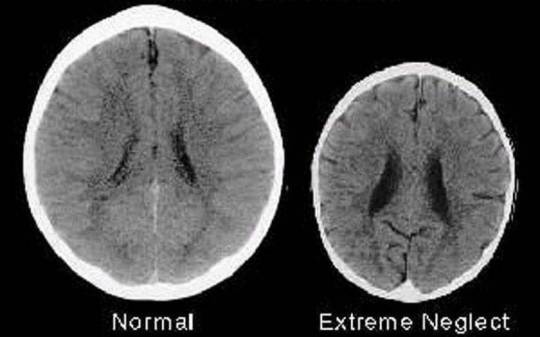
This image is heartbreaking, because these brains belong to two three-year-old children—and the differences are significant.
The brain on the right is missing key areas that are present in the one on the left. These missing parts impact the abilities of the child with the smaller brain:
this child will likely be less intelligent as an adult compared to the one with the larger brain,
will be less capable of empathizing with others,
and will be at higher risk of becoming addicted to drugs and involved in violent crimes.
Additionally, the child with the smaller brain is more likely to remain unemployed and dependent on social services, and may develop mental health issues or other serious health problems.
The large difference in size and development between these two brains is not due to illness or injury, but rather to how the two children were treated by their mothers.
The child with the larger, more developed brain was loved by their mother, who was consistently present and attentive to their needs. The child with the smaller brain, on the other hand, was neglected and abused. It is precisely this difference in treatment that explains why one child's brain developed fully while the other’s did not.
Of course, our favorite vampire spawn isn’t a developing child—but the point is that certain environments and experiences have a profound impact and shape many aspects of our lives, making us more or less equipped to face challenges.
At this point, I’d like to focus a bit on the reasoning process in general. It’s easy to believe that when humans think, make decisions, and reflect on a problem or task, they do so in the most rational way possible. And that’s where we go wrong! First of all, the cerebral cortex — the part of the brain responsible for complex cognitive functions such as thinking, awareness, memory, attention, and language — is located in the upper region of the brain. Most stimuli, in order to reach the cortex, must pass through all the lower areas of the brain, which often trigger behavioral responses even before the stimulus reaches rational thought. For example, the activation of the sympathetic nervous system, which is responsible for danger responses. A silly example: how many times have we jumped out of our skin before realizing that the loud, scary noise was just a window slamming shut? First comes the fear response, then the evaluation of the stimulus follows.
As if that weren’t enough, the brain plays other little tricks on us — without us even being aware of it — because that sneaky thing does a whole lot on its own, especially when it comes to thinking and making decisions.
So... Astarion has a very limited perspective—mostly the one offered by Cazador. As we said earlier, the world is divided into those who have power and those who suffer it. Period. But we all know that in between there are infinite shades of gray, and that can’t be denied. In the same way, Astarion believes that Tav/Durge is the exception to the rule—the only kind person in the world, the one and only for him. But as much as it flatters our ego to hear that, we know very well that no one is that special. It’s always Astarion’s perspective that’s extremely limited. And in fact, here too, Tav/Durge has the opportunity to broaden his view, to point out that the world is full of kind people who would care for him if only he opened himself up and showed kindness in return. This narrow way of thinking and seeing things, this resistance to noticing alternatives, fits perfectly into the category of cognitive biases.
Let’s start with the premise that the human brain needs to be both effective and efficient. That means reaching a result in the shortest time and using the fewest resources. Therefore: when we think and make decisions, we don’t always do so rationally. We use heuristics—mental shortcuts—often following patterns we've used before. A silly example: if I have to cook a dish I’ve made a hundred times, I don’t sit down to rethink how and why I should cook it—I just switch off my brain and do it the way I’ve always done. Many heuristics are good and useful—others, not so much. And when they fall into the latter category, they become biases.
There are many types, but let’s look at one that we all, even us Astarion fans, share. xD Confirmation Bias!
Confirmation bias manifests when we tend to search for, interpret, or remember information that supports our pre-existing beliefs, ignoring anything that contradicts them or isn’t completely aligned.
Once a certain mental imprint forms, new experiences only deepen that groove, without any willingness to explore other interpretative modes—in fact, they tend to further crystallize internal beliefs.
We can say that the person is cherry-picking—in a complex set of data and information, they pick out only what resonates with a belief they already hold, which, in some way, is convenient for them.
The reason is easy to see: if I don’t challenge a belief—even if it’s irrational—I’ll save time, create less friction, and reduce internal and external resistance to a given situation.
Because confirmation bias shows up when a person selects only the evidence that supports their point of view, it easily becomes a self-sustaining system, keeping them locked in an interpretive and experiential microcosm that risks becoming increasingly stifling—a self-built prison.

Astarion is stuck on tracks he’s known inside and out for centuries, forcibly carved into his mind—and for him, it’s all too easy to filter everything through that lens. And this cuts him off from a myriad of possibilities, in a completely unconscious way. It’s like throwing a wrench in your own gears. So Tav/Durge represents an opening to a different value system, one that could replace or at least expand our vampire spawn’s worldview. Not without resistance, of course—those brain connections will get you!
So, to conclude, let’s go back to the beginning and to the statement in question.
"Astarion does not have a well-developed sense of self, and by default, he also lacks many of the skills that a well-adjusted adult should possess."
Yes, maybe out of context it might sound bad. I certainly don’t see Astarion as half a man, incapable of thinking or choosing for himself. But I do recognize that he has serious vulnerabilities that need to be treated with care and taken into account. Not when we're playing—when we play, we do what we like and have fun—but when we analyze him as a character. When Astarion, at the end of the Pale Elf quest, in the good ending, thanks us for saving him from himself, what he means, in my opinion, is exactly this: thank you for supporting me when my vulnerabilities, my fears, my blind spots, and my narrow perspective were getting the best of me. Because, let’s be honest, Astarion’s story is also about this—about rediscovery, about learning to live again, about changing, improving, growing, developing relationships, new abilities and skills. Not as a rogue or as a vampire, or within game mechanics—but as a person.
The point is: Astarion has come out of a horrific situation, one that has to have left marks, wounds, infected pus festering beneath the skin. A situation that never allowed him to understand what he liked, what he wanted, who he really was—simply because he couldn’t express himself, couldn’t think about his own needs, couldn’t say no. Couldn’t develop his sense of self in peace and safety.
A situation that left him unable to face the world and the people in it in a healthy way, unable to identify and express his own feelings, unable to say that damn "no" or to make choices. To decide, yes. And in fact, every time he’s asked what he wants to do, his answers are vague—or he says he doesn’t know, or admits that he’s afraid of those damn choices. He’s afraid of freedom, of consequences, and of everything else beyond the four things he knows—the four fucking things Cazador drilled into him, all around power and control.
And I’m really supposed to believe that the one choice he’s absolutely sure about is Ascension? Hell no. Just like he's not sure he doesn't want to ascend!

References
Rogers, C. R. (1961). On Becoming a Person: A Therapist's View of Psychotherapy. Houghton Mifflin. → A foundational text on the concept of the self, self-actualization, and congruence between real and ideal self.
Winnicott, D. W. (1964). The Child, the Family, and the Outside World. Penguin Books. → Explores the importance of a safe environment in the healthy development of the self.
Bowlby, J. (1969–1980). Attachment and Loss (Vols. 1–3). Basic Books. → Describes how early attachment figures shape our internal working models and sense of security.
Erikson, E. H. (1950). Childhood and Society. W. W. Norton & Company. → Introduces the theory of psychosocial development across the lifespan.
Herman, J. L. (1992). Trauma and Recovery: The Aftermath of Violence—From Domestic Abuse to Political Terror. Basic Books. → Explains complex trauma, victim-perpetrator dynamics, and the long-term effects of abuse.
van der Kolk, B. A. (2014). The Body Keeps the Score: Brain, Mind, and Body in the Healing of Trauma. Viking. → Offers neuroscientific insight into how trauma reshapes the brain and affects emotional regulation.
Siegel, D. J. (2010). The Mindful Brain: Reflection and Attunement in the Cultivation of Well-Being. W. W. Norton & Company. → Discusses neuroplasticity, integration, and the development of a coherent sense of self.
Kahneman, D. (2011). Thinking, Fast and Slow. Farrar, Straus and Giroux. → A deep dive into heuristics, decision-making, and cognitive biases like confirmation bias.
Malaguti, E., & Morganti, P. (2014). Psychotraumatology: An Integrated Model for Trauma Treatment. (Translated from the Italian). FrancoAngeli. → Addresses the psychological and neurological consequences of prolonged trauma.
#astarion#astarion ancunin#baldur's gate 3#bg3#baldurs gate 3#baldurs gate#astarion bg3#baldurs gate 3 astarion#baldur's gate astarion
129 notes
·
View notes
Text
Navigating the Fine Line Between Curiosity and Respect
The Fine Line Between Speculation and Respect
Fandoms can be a space to connect with others, celebrate creativity, and share our love for art and stories that bring us joy. But sometimes, the line between healthy curiosity and invasive speculation can blur. I want to start by reflecting on my own behaviour.
My Own Reflection
I’m not innocent in all of this. There have been times I’ve written long, drawn-out paragraphs about people I don’t know, trying to be respectful, but I’m sure I’ve added unnecessary dialogue to conversations I probably shouldn’t have.
That’s something I’m working on. I’ve been trying to step back, take more care in what I post, and remind myself that I am in control of what I put out into the world. Speculation doesn’t always land the way we intend it to, and even when we try to be respectful, it can still cross a line.
I know not everyone will agree on what constitutes respectful speculation - opinions differ, and that’s fine. But some boundaries should be common knowledge (even though I recognize that common knowledge isn’t always common). If I can continue writing posts like this, maybe it will encourage at least one person to reflect on their own posts and responses in the future.
Speculation Isn’t Fact
Curiosity is natural in fandoms, but it’s important to remember that curiosity doesn’t always lead to truth. When we analyze photos, interviews, or social media activity, it’s easy to assume we’re uncovering a deeper meaning, but that’s rarely the case.
What It Is: Analyzing photos, interviews, or social media activity can be fun, but it doesn’t make us experts on someone’s life. Public moments are often curated, and their meaning isn’t always what we think.
Why It Matters: Treating speculation as fact can lead to invasive behaviours, create unnecessary drama, and harm the people we admire.
Takeaway: Enjoy the public content shared by celebrities, but avoid building entire narratives around it.
The Problem with "Receipts"
In fandoms, there’s often a desire to “prove” our theories using screenshots, likes, or comments. But piecing together public content doesn’t always reveal the full story and can sometimes cross the line into invasiveness.
What Happens: Fans often compile "evidence" to support their theories, from social media likes to reflections in random items.
The Issue: Public materials are incomplete, curated, and often out of context. Trying to prove something this way can easily veer into invasion of privacy.
How to Adjust: Accept that some things will remain unknown. It’s okay not to have all the answers about someone else’s life.
Boundaries and Real People
It’s easy to get swept up in fandoms and forget that celebrities are real people with boundaries. Treating their lives like puzzles to solve doesn’t just invade their privacy - it can also create toxic dynamics within fandom spaces.
The Overstep: Fans sometimes project narratives onto celebrities or treat their lives like puzzles to solve.
The Consequence: This can lead to toxic dynamics, such as unwarranted scrutiny, divisive debates, or harmful rumours.
The Reminder: These are real people with boundaries and private lives. Treating them with respect means stepping back when curiosity turns invasive.
Bodies Are Not Public Property
One of the most harmful and invasive behaviours in fandoms is speculation about someone’s body. Whether it’s assuming a pregnancy, commenting on weight, or analyzing clothing choices, this kind of speculation reduces people to their appearances.
The way someone looks or dresses is not an invitation for speculation. People have all types of bodies, and changes happen for countless reasons, none of which are anyone else’s business.
Assuming someone is pregnant based on their appearance is fucked up. Pregnancy is a private matter, and speculating about it adds unnecessary pressure and perpetuates harmful norms about how people “should” look.
Using vague terms instead of “pregnancy” doesn’t make speculation any less harmful either. It’s still invasive and entirely inappropriate.
The Problem: Speculating about someone’s body - whether it’s about pregnancy, weight, or clothing choices - is invasive, harmful and fucked up.
Why It’s Harmful: Comments like "She looks pregnant" reduce someone’s identity to their appearance and perpetuates harmful norms.
A Better Approach: Celebrate people for their achievements, not how they look. If someone wants to share personal details, let them do so on their own terms.
Happiness Isn’t Always Visible
It’s easy to interpret a smile in a photo or a laugh in a video as proof of happiness, but those moments are just snapshots. They don’t reveal the full story of someone’s life or emotional state.
The Oversight: Saying, "They look so happy" based on a photo or video assumes we know someone’s emotional state.
The Reality: A smile or a laugh is a snapshot of a moment, not a window into someone’s whole life. People can smile through pain or appear joyful in curated content.
What to Do Instead: Appreciate the joy you see, but don’t let it become proof of anything beyond that moment.
A Reflection on Recent Drama
Lately, this fandom has been filled with so much drama. People are fighting back and forth, belittling others, and trying to prove they’re right while others are wrong. There’s a constant digging into information - into things that probably should just be left alone. It’s become mean, disrespectful, and far removed from the joy that brought us all here in the first place.
It’s not a battleground for personal attacks, invasiveness, or trying to “win” arguments. It’s a space for celebrating the art and the stories that bring us together.
A Call for Respect
At its best, fandoms are a space for joy, creativity, and connection. It’s a way to celebrate the art and people we admire.
Let’s focus on what’s been shared with us and appreciate it for what it is, rather than trying to project meaning onto things that aren’t there. We can engage, speculate, and discuss respectfully without crossing into harmful or invasive territory.
Fandom spaces can - and should - be fun, kind, and thoughtful. Let’s make them that way - for the fans and the people we admire. ❤️
37 notes
·
View notes
Text
Great Life - A Spiritual Story
The equal opportunity of living a great life doesn’t necessarily exist for every single one of us. Some cultures, geographical points and birthing circumstances, do lend themselves to more obstacles in the journey toward a great life. That’s not to say that any one of us cannot potentially overcome where we began, it’s just that not everyone actually will be able to, or have assistance, or a road map to find their way to their own great life experience.
Those of us who do have access, and a much easier pathway toward a great life, are very fortunate indeed. I feel that for me, and most of you reading this, that a great life is not only possible, it’s also worth pursuing.
I have personally lived a great life already. To live big is to be happy, to pursue dreams, to be on purpose and to love and be loved.
I feel that all of these in many cases, is absolutely achievable, and definitely worth our time to continue to create and generate as a reality.
When I was younger I viewed the privileged, celebrity, wealthy, Royals as those who really lived a great life. I believed (wrongly) that to have more choices, more money and more opportunities, made it automatically a great life. With over 30 years of experiencing humanity in all its forms, guiding, channeling and healing hearts during all that time, I’ve realized so much about the suffering and challenges myself and my fellow humans have faced. One of the greatest understandings that’s come out of the work, has been that we all face our own challenging circumstances, with how we think, and how we feel about everything.
The mental and emotional view we take makes our reality what it is.
This is a big part of whether we endure what we are gifted as life experiences, or whether we choose to participate in enjoying a great life, almost regardless of the journey that helps us to reach that enjoyable part.
My finest example is mine.
I married my first real love. I met him at 16 and we traveled around the World in 80 days, in an adventure of a lifetime at 20 years old. We loved the excitement of experiencing life elsewhere, and we moved to America. He had huge family drama, and it changed him completely. He wasn’t the man I’d first met, and he left me behind. W
e split, with two children and one of the all-time worst partings I’ve ever seen, to this date. It was an ugly divorce. I literally (after years of struggle and turmoil) had to let my children leave me behind them, and they never looked back. As the marriage crumbled, I met a kind man who I spent 14 years with, and we had sweet times, in spite of our 25 year age gap. He and I traveled across most of the 50 States of America, on a great adventure, with love and laughter.
When he passed, I was totally lost. Suddenly at 52, I was single for the first time since I was 16. Navigating a World I’d never lived in before, was more than challenging. I really didn’t love it, and more often than not I forgot to reflect back on the great life I’d already lived.
I moved to Maui, Hawaii, close to a dear, beloved friend. I met the man of my dreams. He is the partner, twin flame and soul I’ve known existed all along. We are together and I intend keeping him around for the rest of this life.
I am living a great life, and because I am so happy, I can now reflect back on all the years I’ve so far lived, with the pleasure of living my great life. I can’t wait for the next chapter in this, my greatest life.
As always, please share this post with anyone that you feel can benefit from it! Please like us on your social media channels and subscribe to our mailing list if you haven't already done so! We are mailing out a monthly newsletter and a recap each week of our blog posts and interesting tidbits! This is how you can stay informed with what is new in the world of The Holistic Soul Healer!!
Love & Blessings,
Ruth
Get personal with your Angels!! Connect with me and see what they have to say!!
BOOK NOW!
#inspirational#motivational#life coaching#The Holistic Soul Healer#psychic#Ruth Kramer#intuitive guidance#intuitive healing#guided meditation#going within#inner guidance#spiritual teacher#universal consciousness#reiki master#healthy life style#Shamanic Sound Healing#Shamanic Heart Ceremonies#Crystal Grid Healing#Intuitive Birth Chart Reading#Animal Intuitive#Past Life Regression#Entity Detachment Therapy#Spiritual Advocacy#Medical intuitive#Clairvoyance
0 notes
Note
I only watch the ofmd fandom from afar but some people give the impression of not conciliating well how the show is light hearted and comforting but also deals with heavy subjects in a general violent contex. the fact I've seen people say there's no homophobia when it's the central driving force of the plot is the most exaggerated example. but it's also in this attempt to flatten characters into "uwu baby" and "who's right vs who's wrong" (or at worse who's an abuser) when the show clearly does its best to create a likable flawed cast. Stede is extremely insecure and a horrible father/husband even before he abandons his family. Ed is an abuse survivor and he struggles with anger. Izzy is an asshole and it's funny- I mean he's a brit working class caricature. those things interact and its what makes the show human and interesting. why try to smash it into a simplistic dichotomy. it won't work 😭😭
and obviously you know all of this. so I guess it's: thanks for having braincells 😘😘
I don't actually know how old this ask is, but, it's been in my inbox for a while lol, sorry!
I think observing from a distance might be the most enjoyable way, it's been years since I was this close to the centre of a fandom and it's wild.
But yes, you're absolutely correct, it's a show about flawed characters and their ability to realise they're in the wrong, and change themselves - if that's what they want! Obviously not every character is given this opportunity, nor should they be, but I think my main issue with people coming down on the characters either way is that currently, they're unfinished!
...maybe Izzy will get worse next season, maybe his racism/general abusiveness and manipulation will become his main character traits, maybe his arc is that he rejects offers of kindness and belonging because of his own prejudices/self-importance and in the end this destroys him. I'd love to see that play out, but I'd love to see whatever they do with him play out too.
Taking a break for a while really made me realise that actually, this is a comedy show about pirates? What Are We Doing??
I love the meta and the drawn out explanation - I am an English Literature and Media Studies graduate, like literally I dedicated years of my life to this stuff! But one of the main reasons for these analyses is that it's supposed to be a discussion, there are supposed to be disagreements and alternative theories, and you should look at whether the evidence is actually in support of what is being said.
It isn't about deciding what is moral/immoral content to consume. Especially in a comedy show, where the character people are angry about is so cringe-fail within the show itself, and who's worst traits seem only to be evident through close-reading.
One of the first things you learn if you take Lit/Media in higher education is that you can be wrong about a text. You can't just say whatever you want without actual textual evidence (and, pet-peeve, but I personally do not count interviews etc). And sometimes, completely contrasting information can be true - because of the ambiguity! Whether these meanings are intentional or not - this is unknowable. And of course you can have your own personal opinions or readings of a text, but it's weird to decide that because you are right, everything else must be wrong.
I also see posts that essentially read - "this character is deep and multifaceted and we should look closely at them. But this character sucks and if you engage with content that looks closely at them then you suck too!" And I can't help but feel that that's worse than if we weren't to engage with textual analysis at all. Ignoring the actions of "evil" characters, who shape the narrative, feels very dismissive to me - disrespectful both to the text itself but also to the real world issues that it draws from.
I suppose in conclusion, everyone continue to think critically, consume media critically, but also, touch grass sometimes. and maybe read a book too.
#woes of emily#hhhh should i main tag this??#ofmd#is that. was that. a mistake?#long post#thank you for this ask/ a reason to say all of this essentially lol#i probably am wrong about some of this and that's fine. a lot of it is quite simplified and not universally true#thats because this is a response to an ask on tumblr and not an academic essay#i do think that fiction can affect real life. i think this is why things like copaganda exists#media is also a reflection is real life - whether we intend it to be or not. it's impossible for it not to be#but i also think the only way to combat this is to consume critically#and not write things off as problematic and simply ignore it like it's not there?#but i ALSO understand that engaging with a text in this way takes extra energy that we don't always have#especially when its for a silly. comforting. diverse. comedy show#that also just happens to deal with some big issues in a really engaging and often subtle way....#it's a complex issue!!#im a big fan of giving people the benefit of the doubt when it comes to things#and maybe that's one's on me but#I'd personally rather assume that other people also. have braincells. as the anon worded it here#than swathe entire sections of the fandom in accusations of supporting racism/homophobia/abuse etc etc#🤷♂️ idk#it's a complex issue i guess and i dont have the answers#and ive not even been actively looking for them#I'm just a guy#ask#anon#ask to tag
10 notes
·
View notes
Note
Hi. I’m curious. What did you mean by “women who read fiction might get Bad Ideas!!!” has just reached its latest and stupidest form via tumblr purity culture.? I haven’t seen any of this but I’m new to tumblr.
Oh man. You really want to get me into trouble on, like, my first day back, don’t you?
Pretty much all of this has been explained elsewhere by people much smarter than me, so this isn’t necessarily going to say anything new, but I’ll do my best to synthesize and summarize it. As ever, it comes with the caveat that it is my personal interpretation, and is not intended as the be-all, end-all. You’ll definitely run across it if you spend any time on Tumblr (or social media in general, including Twitter, and any other fandom-related spaces). This will get long.
In short: in the nineteenth century, when Gothic/romantic literature became popular and women were increasingly able to read these kinds of novels for fun, there was an attendant moral panic over whether they, with their weak female brains, would be able to distinguish fiction from reality, and that they might start making immoral or inappropriate choices in their real life as a result. Obviously, there was a huge sexist and misogynistic component to this, and it would be nice to write it off entirely as just hysterical Victorian pearl-clutching, but that feeds into the “lol people in the past were all much stupider than we are today” kind of historical fallacy that I often and vigorously shut down. (Honestly, I’m not sure how anyone can ever write the “omg medieval people believed such weird things about medicine!” nonsense again after what we’ve gone through with COVID, but that is a whole other rant.) The thinking ran that women shouldn’t read novels for fear of corrupting their impressionable brains, or if they had to read novels at all, they should only be the Right Ones: i.e., those that came with a side of heavy-handed and explicit moralizing so that they wouldn’t be tempted to transgress. Of course, books trying to hammer their readers over the head with their Moral Point aren’t often much fun to read, and that’s not the point of fiction anyway. Or at least, it shouldn’t be.
Fast-forward to today, and the entire generation of young, otherwise well-meaning people who have come to believe that being a moral person involves only consuming the “right” kind of fictional content, and being outrageously mean to strangers on the internet who do not agree with that choice. There are a lot of factors contributing to this. First, the advent of social media and being subject to the judgment of people across the world at all times has made it imperative that you demonstrate the “right” opinions to fit in with your peer-group, and on fandom websites, that often falls into a twisted, hyper-critical, so-called “progressivism” that diligently knows all the social justice buzzwords, but has trouble applying them in nuance, context, and complicated real life. To some extent, this obviously is not a bad thing. People need to be critical of the media they engage with, to know what narratives the creator(s) are promoting, the tropes they are using, the conclusions that they are supporting, and to be able to recognize and push back against genuinely harmful content when it is produced – and this distinction is critical – by professional mainstream creators. Amateur, individual fan content is another kettle of fish. There is a difference between critiquing a professional creator (though social media has also made it incredibly easy to atrociously abuse them) and attacking your fellow fan and peer, who is on the exact same footing as you as a consumer of that content.
Obviously, again, this doesn’t mean that you can’t call out people who are engaging in actually toxic or abusive behavior, fans or otherwise. But certain segments of Tumblr culture have drained both those words (along with “gaslighting”) of almost all critical meaning, until they’re applied indiscriminately to “any fictional content that I don’t like, don’t agree with, or which doesn’t seem to model healthy behavior in real life” and “anyone who likes or engages with this content.” Somewhere along the line, a reactionary mindset has been formed in which the only fictional narratives or relationships are those which would be “acceptable” in real life, to which I say…. what? If I only wanted real life, I would watch the news and only read non-fiction. Once again, the underlying fear, even if it’s framed in different terms, is that the people (often women) enjoying this content can’t be trusted to tell the difference between fiction and reality, and if they like “problematic” fictional content, they will proceed to seek it out in their real life and personal relationships. And this is just… not true.
As I said above, critical media studies and thoughtful consumption of entertainment are both great things! There have been some great metas written on, say, the Marvel Cinematic Universe and how it is increasingly relying on villains who have outwardly admirable motives (see: the Flag Smashers in The Falcon and the Winter Soldier) who are then stigmatized by their anti-social, violent behavior and attacks on innocent people, which is bad even as the heroes also rely on violence to achieve their ends. This is a clever way to acknowledge social anxieties – to say that people who identify with the Flag Smashers are right, to an extent, but then the instant they cross the line into violence, they’re upsetting the status quo and need to be put down by the heroes. I watched TFATWS and obviously enjoyed it. I have gone on a Marvel re-watching binge recently as well. I like the MCU! I like the characters and the madcap sci-fi adventures! But I can also recognize it as a flawed piece of media that I don’t have to accept whole-cloth, and to be able to criticize some of the ancillary messages that come with it. It doesn’t have to be black and white.
When it comes to shipping, moreover, the toxic culture of “my ship is better than your ship because it’s Better in Real Life” ™ is both well-known and in my opinion, exhausting and pointless. As also noted, the whole point of fiction is that it allows us to create and experience realities that we don’t always want in real life. I certainly enjoy plenty of things in fiction that I would definitely not want in reality: apocalyptic space operas, violent adventures, and yes, garbage men. A large number of my ships over the years have been labeled “unhealthy” for one reason or another, presumably because they don’t adhere to the stereotype of the coffee-shop AU where there’s no tension and nobody ever makes mistakes or is allowed to have serious flaws. And I’m not even bagging on coffee-shop AUs! Some people want to remove characters from a violent situation and give them that fluff and release from the nonstop trauma that TV writers merrily inflict on them without ever thinking about the consequences. Fanfiction often focuses on the psychology and healing of characters who have been through too much, and since that’s something we can all relate to right now, it’s a very powerful exercise. As a transformative and interpretive tool, fanfic is pretty awesome.
The problem, again, comes when people think that fic/fandom can only be used in this way, and that going the other direction, and exploring darker or complicated or messy dynamics and relationships, is morally bad. As has been said before: shipping is not activism. You don’t get brownie points for only having “healthy” ships (and just my personal opinion as a queer person, these often tend to be heterosexual white ships engaging in notably heteronormative behavior) and only supporting behavior in fiction that you think is acceptable in real life. As we’ve said, there is a systematic problem in identifying what that is. Ironically, for people worried about Women Getting Ideas by confusing fiction and reality, they’re doing the same thing, and treating fiction like reality. Fiction is fiction. Nobody actually dies. Nobody actually gets hurt. These people are not real. We need to normalize the idea of characters as figments of a creator’s imagination, not actual people with their own agency. They exist as they are written, and by the choice of people whose motives can be scrutinized and questioned, but they themselves are not real. Nor do characters reflect the author’s personal views. Period.
This feeds into the fact that the internet, and fandom culture, is not intended as a “safe space” in the sense that no questionable or triggering content can ever be posted. Archive of Our Own, with its reams of scrupulous tagging and requests for you to explicitly click and confirm that you are of age to see M or E-rated content, is a constant target of the purity cultists for hosting fictional material that they see as “immoral.” But it repeatedly, unmistakably, directly asks you for your consent to see this material, and if you then act unfairly victimized, well… that’s on you. You agreed to look at this, and there are very few cases where you didn’t know what it entailed. Fandom involves adults creating contents for adults, and while teenagers and younger people can and do participate, they need to understand this fact, rather than expecting everything to be a PG Disney movie.
When I do write my “dark” ships with garbage men, moreover, they always involve a lot of the man being an idiot, being bluntly called out for an idiot, and learning healthier patterns of behavior, which is one of the fundamental patterns of romance novels. But they also involve an element of the woman realizing that societal standards are, in fact, bullshit, and she can go feral every so often, as a treat. But even if I wrote them another way, that would still be okay! There are plenty of ships and dynamics that I don’t care for and don’t express in my fic and fandom writing, but that doesn’t mean I seek out the people who do like them and reprimand them for it. I know plenty of people who use fiction, including dark fiction, in a cathartic way to process real-life trauma, and that’s exactly the role – one of them, at least – that fiction needs to be able to fulfill. It would be terribly boring and limited if we were only ever allowed to write about Real Life and nothing else. It needs to be complicated, dark, escapist, unreal, twisted, and whatever else. This means absolutely zilch about what the consumers of this fiction believe, act, or do in their real lives.
Once more, I do note the misogyny underlying this. Nobody, after all, seems to care what kind of books or fictional narratives men read, and there’s no reflection on whether this is teaching them unhealthy patterns of behavior, or whether it predicts how they’ll act in real life. (There was some of that with the “do video games cause mass shootings?”, but it was a straw man to distract from the actual issues of toxic masculinity and gun culture.) Certain kinds of fiction, especially historical fiction, romance novels, and fanfic, are intensely gendered and viewed as being “women’s fiction” and therefore hyper-criticized, while nobody’s asking if all the macho-man potboiler military-intrigue tough-guy stereotypical “men’s fiction” is teaching them bad things. So the panic about whether your average woman on the internet is reading dark fanfic with an Unhealthy Ship (zomgz) is, in my opinion, misguided at best, and actively destructive at worst.
461 notes
·
View notes
Note
Hi, do you think they way people analyze a story in can tell us about their upbringing, social values and their perspective of life? Also, some people on internet (especially twitter) love to shit on some heavily flawed characters whose problems stems from trauma. The story asks us to be empathetic but they still shit on them despite understanding it. Do you think this is how they will treat traumatized people in real life as well?
Sure, but not in the simple 1=1 way fans most often assume. People are highly complex and taste in media is also highly complex, and should not inherently be moralized. Notice the caveat there. And also nuance, because different people can have different standards and have different levels of tolerance because of experiences and beliefs, and that's okay. Most often in fandom you get antis who scream everything you like in fiction is 1=1 reality, when that's psychological baloney, and then you get "fiction is not reality" which works to refute the anti perspective but doesn't hold up to nuance either, because fiction is a part of reality and thereby reflects and is influenced by and influences it--but not in the simplistic way antis assume (see all the "video game violence" panic).
tl;dr it's way too complicated to get into in a post on tumblr.
But, regarding how people shit on abuse survivors. It's true that irl society at large does not like abuse survivors who show signs of being abused (shockingly, abuse does not usually make someone a nicer person! it's almost like having your human worth and dignity denied might hurt lol). It's also true that people consuming fiction have different experiences and baggage and even triggers, and are not required to feel empathy for every single person (or character) out there (that's part of empathy that I think people negate to consider: it's great to feel empathy for everyone we can, but in a broken world not everyone can for everyone; that said, there's a difference between being like "mm not for me, sorry" and "everyone who feels empathy for x character is a fascist abuser!")
I do think people who constantly post terrible things about abuse survivors in fiction are likely not intending to be mean to survivors IRL. However, they might want to consider how seeing that kind of thing makes abuse survivors feel--because, to me, it doesn't feel great to see. Add in a fair amount of moralizing, which usually occurs, and you've got a weapon that, whether you intend to or not, is probably going to hurt those around you.
26 notes
·
View notes
Text
Addressing Content Warning Concerns
I am writing in response to points that were brought up concerning my recent post. If you haven’t read that post, you can find it here.
Be warned that this is a very long post (2.8k words). It deals with the topics of pedophilia and rape. Opinions expressed are my own; however, I do offer some resources for you to better educate yourself on this post’s content.
I will not provide a link to the user that responded as she had no ill intentions. Disclaimer if the said user reads this post, I write with peace and love at 4:00 A.M. There are a couple of places where I may sound aggressive or petty, but it is analytical and not meant to invalidate you or your opinions.
Red = user’s response with minimal changes (adjusted for grammar and clarification)
Black = my response
Part 1: Age Regression and Infantilization
To learn more about age regression, here are two lovely articles describing what age regression means medically and socially.
“Age regression [agere] is a form of coping meant to eliminate stress in potentially triggering situations. Agere is not a part of sexual play and never should be. I believe [Moni] is confusing agere for age play.”
This completely misses the mark. I understand that age regressors enter a younger psychological state often as a coping mechanism. There is nothing inherently wrong with age regression as therapy. My complaints are that people are FETISHIZING age regression. As stated in my post, age regressors enter the mindset of a child commonly called a “little space.” These individuals are to be treated like children as it helps them feel safe and loved.
In my experience on Tumblr, writers commonly misinterpret Daddy Dominant, Little Girl (DDLG) or Age Play (the larger, umbrella term) for age regression. For the purposes of explanation, I am going to be using DDLG and she/her pronouns. DDLG is a type of BDSM relationship where the dominant partner (male) takes on the role of a care-giver while the submissive partner (female) takes on the role of a child. This dynamic is pretend and intended for sexual interactions. Keyword here: pretend. While the submissive portrays childish behavior, she still has an adult mindset; therefore, she can give meaningful consent. Once writers describe the submissive slipping into “little space,” her mindset is corrupt as she has age regressed; therefore, she cannot give meaningful consent making the interaction non-consensual as she embodies a child.
“Infantilization is treating somebody as if they’re a child. For example, ‘babying’ someone is the best explanation for it. This, in my opinion, is not pedophilia because it’s not inherently sexual. If it IS sexual, I wouldn’t necessarily classify it as pedophilic, but it is questionable.”
Again, this misses the mark. In a non-sexual context, infantilization is completely okay. My complaints are that people are FETISHIZING the infantilization of characters. I used this term as an alternative language to age regression because I have encountered both on this site.
“Age Play, in my opinion, is pedophilic due to how the 'older’ of the partners is benefitting from it. So if [Moni] and I are thinking the same thing, but not really using the same terminology, then I agree.”
Age Play is a kink in the BDSM community between two consenting and level-headed adults.
Age Regression is characterized by regressing back to a younger headspace.
Sexualizing age regression is pedophilic because age regressors feel, act, and exhibit childlike qualities; they genuinely believe that they are a child.
If age play includes “little space,” then it is pedophilic because the submissive has age regressed.
“None of these is what I would consider illegal due to the fact that both parties are consenting adults. But age play definitely is pedophilic. But, obviously, if both people are adults, it can’t be considered illegal.”
I called pedophilia (and rape) illegal. In the eyes of the law, sexualizing age play--given that the individual is of age--is legal. This point used the transitive property of equality (Trans POE) to point out the hypocrisy in condemning pedophilia but supporting the fetishization of age regression. To clarify, it may not be illegal, but it is morally wrong.
“Infantilization and age regression aren’t inherently pedophilic because they revolve around the idea of a mindset and not physicality.”
This is contradictory to your previous point and only half true. Age regressors largely rely on physical objects (ie. clothes, stuffed animals, pacifiers) to feel safe. While the root of age regression involves a change in psyche, it is reflected in their appearance and environment.
Part 2: Dubious Consent and Non-consensual
To learn more about rape, here is a wonderful article on non-consensual sex.
“Secondly, I’m quite confused on what she [Moni] is saying regarding calling dubcon [dubious consent] and noncon [non-consentual] rape instead of dubcon and noncon.
They are rape, or at least some form of sexual assault, but I don’t think anyone’s trying to mask them from being as such.”
I whole-heartedly disagree. It is apparent by the staggering number of dubcon and noncon posts that people use these terms to try and justify writing rape because they consider it a “fetish.” The reason I am against these terms is that writers never specifically condemn them. Oftentimes, writers mix the content of the fic into their warning section. So, by writing ‘blowjob’ next to ‘dubcon’ it underscores the severity of the situation.
“Categorizing both of the two as 'rape’ could potentially end up being very damaging. Rape is a very triggering and harsh word for some people, which is why I believe a lot of people use non-consensual sex as a term to avoid potentially triggering people.”
Again, I believe that people use dubcon and noncon to try and justify their rape “fetish.” However, if using the term “rape” is triggering to some individuals and the terms “dubcon” and “noncon” are used as a substitution, why aren’t these writers coming out and explicitly saying that they do not support these types of interactions? Furthermore, why are they writing and sharing this content in the first place if they acknowledge it as rape?
“Also, I think it’s important to clarify whether the 'sexual assault’ in fiction is dubious or non-consensual. There’s a big difference between both parties being drunk in a fic (dubcon) and hard rape, and it’s important to distinguish the two in warning columns.”
Drunk people can’t consent. Both situations are rape. The “level” of rape that you refer to, being how consensual it is, is more damaging in my opinion. Because they were drunk, it means less than if they were sober. This perpetuates victim shaming. She was asking for it. She shouldn’t have drunk so much. Rape is rape. It is never okay. And one rape is never better than another.
“Dubcon is also very important to clarify in fics due to the fact that dubcon is only a fictional concept. It helps indicate the level of consent given in the fiction because someone could be not triggered by sex under intoxication but can be triggered by hard noncon.”
I’m going to use a quote I cited from this source because I feel that the writer describes dubcon more eloquently than I can: “What bothers me the most about this situation, and what I think you are partly getting at here, is when people say that their fic isn't "noncon" or they say it is "dubcon" or "noncon depending on your point of view." Come on! Have the guts to admit that what they're writing is rape. Dubious consent bothers me as a qualifier because if you aren't sure whether someone is consenting, you don't do it or it's rape. No excuses. So, I think that people should just bite the bullet and say, this is a rape fic.... If people want to write rape fic, go for it, and I will probably read it, but let's step up and acknowledge what it is we are writing. I take issue with these qualifiers because I think that it is far more insidious than out and out rape porn. At least when we say it is rape, then we can move on to the next step: saying it's wrong, just a fantasy, etc. But avoiding the label perpetuates the rape myths that have had such a damaging effect on victims and justice: did she enjoy it, she didn't really say no, she was a tease, they've done it before. None of those things matter, and when a person labels their fic, they need to stop pretending they do.”
Essentially, the writer is reiterating what I explained in my previous comment that rape is rape. Another statement that I found describes how damaging fiction can be in real life. While most readers understand that what occurred didn’t really happen, there are real-life consequences attributed to it: “...However, not everyone in fandom uses those terms in those ways. And I think that's a problem that we need to fix. Because, especially when situations that exist in real life and that would be called rape in real life are labeled "dubcon," I think it does real harm to us all.....We currently live in a culture where not fighting back - because, for example, the rapist has threatened to kill you, or someone else, or your pet, if you don't go along with it - will very often get a rape case overturned in court. Where judges and juries and god knows the popular media will pick out and analyze every detail of a person's life to determine whether they were asking for it, whether they secretly wanted it, whether they could have conceivably fought back more than they did, why they didn't scream, why they didn't report the blackmail that was used to control them, whether or not their "consent" might've been implicitly given by winks or nods or secret handshakes or a general miasma of sexual invitation. In other words, we live in a world in which rape culture, a thing we all unwittingly participate in at one time or another, works very very hard to label things dubcon when they're really noncon.”
“Most people 'romanticizing’ non-consensual sex are victims who are trying to gain some sort of control over their trauma, so they have every right to do so. If a victim of rape should have the ability to choose whether or not they want to read/write a noncon fic and if they don’t want to use the word rape because it makes them uncomfortable, they don’t have to and shouldn’t be forced to.
As a victim of rape and sexual assault, I find peace in having the control and ability to write about my trauma. It's a way for me to gain back control that I lost and the word rape does make me uncomfortable, it makes many victims uncomfortable, and if I prefer not to use that word then I should not have to if people know synonymous terms.”
Romanticize: deal with or describe in an idealized or unrealistic fashion; make (something) seem better or more appealing than it really is.
If you are writing/reading smut, you are trying to get off. If you are writing/reading dubcon/noncon smut, you are getting off to rape. Instead of writing/reading about how heinous rape is and how disgusting rape culture is, you write/read fics romanticizing rape since as a reader you enjoy the content to some extent: it is with your favorite character, it takes place in a cool universe, it got you horny, you felt good after reading it. Romanticizing rape is damaging to society as it subconsciously makes rape appealing. I doubt that is the intention, but you can’t deny that these underlying connections exist.
There is a difference between writing to cope and writing to entertain. My intention has never been to victim shame. But writing non-consensual sex between anime characters and a reader-insert is a form of entertainment. Remember the purposes of writing we learned about in elementary school? Yeah, I have a hard time believing that this is therapeutic. Journal therapy uses reflective writing to work through trauma and mental health issues. In sexual assault cases specifically, victims often write about their experience and/or letters to their perpetrator(s). However, if this is your way to cope, that’s fine. But writing rape fics is not the same as sharing rape fics.
“People know the severity of noncon and dubcon, which is what I think [Moni] is missing. No one is trying to not make noncon rape because it is rape. People know that it is. Most people just chose to say 'noncon’ to avoid unnecessarily triggering others.”
Do they? I think to my previous comments in this section, people use these terms to downplay the seriousness of rape.
“And there are far more 'consensual’ fics out there than noncon/dubcon fics, so I don’t exactly understand what [Moni] means by 'romanticize’ or 'normalize it.���”
Two comments up I describe what romanticization is and how it is being done in the community. I’m going to ignore the number part of this statement because I feel that there is no relevance; If there is a platform for rape fics and people are engaging with them, numbers don’t matter relative to another type of fic. I call that authors romanticize consensual sex because it is oftentimes not explicitly stated, and I think it should be. The character(s) and reader are in a relationship and sex is a byproduct of that (I do not consider this dubcon). Personally, I have found very few fics where explicit consent is written in. People sometimes think that asking for consent interrupts the flow and ruins a moment. Works of fiction have an impact on real life, and writing/reading about consent serves to reinforce healthy practices.
“Going off of that, I don’t understand what [Moni] means by 'fairly young’ audiences. I'm hoping that most 18+ consumers are, you know, eighteen or older (obviously that's not the case in all situations), and eighteen is a legal adult. Most people over the age of eighteen are very aware of what these terms mean, and they know right from wrong. So, there should be no need to clarify what 'noncon’ is for them.”
My point is that this community is relatively young. I have not encountered many writers or readers who are over the age of 25 (if you are, kudos). At this age, you lack experience. Many of these readers have never had sex or been in a relationship before. While you might know the difference between rape and consensual sex on paper, some of these things are more subtle--especially in person. You referenced drunk sex as something that you’d classify as dubcon although intoxicated individuals can’t consent. I recently read a fic where the reader was drunk and picked up at the bar by a character. He asked the reader if they consented to sex and they agreed. This is still rape as you cannot consent while intoxicated since alcohol impairs judgment. Regardless of enjoyment, which the reader experienced, this is still sexual assault. Can you see the confusion by labeling that dubcon? What is a young adult to think when they’ve been manipulated into sex but told they consented? It’s confusing, so these terms should be clarified.
Part 3: Fiction
To learn more about how fiction affects reality, here is this interesting TED-Ed animation that summarizes fiction’s impact. Also, I read this article that cites more examples.
“Also, our writing shouldn’t have to equate 'good practices,’ because a healthy-minded individual knows how to separate fiction and reality. Give people the freedom to write about whatever they want, whether it’s in private or not, that's what fiction is for.”
You claim that you don’t want to use the word rape to trigger people, so you acknowledge that not all readers are health-minded as they could be suffering from trauma or mental illness. Likewise, some individuals can’t discern fiction from reality.
More importantly, there is a connection between fiction and reality.
“Finally, I don't think we should be so open with connecting real-life issues with fictional ones. No one is going to become a rapist or want to be raped because they read fiction on it unless they’re truly a rapist or have been raped. Equating fictional works to real-life problems is a little insulting, whether [Moni] intended it to be or not.”
Watch the video and read the article. Fiction directly impacts culture and society. It may be insulting, but it’s factual.
“Because in the end, in rape fiction, no one actually got raped. In pedophilic fiction (I don’t support it don’t get me wrong), no one was actually a victim of pedophilia. Because they’re all fictional.”
That doesn’t make it okay. Again, my problem is that writers ROMANTICIZE these topics which reflect poorly on society.
“If someone is concerned about pedophilia and rape fiction, I believe it would be best to work towards real-life solutions to those real-life problems compared to criticizing fiction authors.”
If you’re concerned about pedophilia and rape FICTION, I’d hope you’d criticize FICTION authors. Honestly, this seems to be a diversion tactic to avoid accountability.
Part 4: “No Offense, but You’re Wrong About Everything”
“Overall, I think [Moni] had good intentions, but it was poorly worded.
You pose a counter argument to each of my points and make it sound like I did not educate myself beforehand. You then deflect to talking about rape and pedophilia in real-world context to downplay the severity of pedophilia and rape in fiction.
I sound petty here, and I do not mean for my words to hurt. I wish that there was some communication beforehand since it seems that there was confusion. If my original post was unclear, I hope my comments help.
Conclusion
This is for everyone:
Please check out the resources I provided and do your own research to understand the situation before forming your own opinion.
No hate to the writer of the response. I just wish you would have reached out directly for clarification before taking my words out of context and assuming their meaning.
#haikyuu x reader#haikyuu smut#haikyu x reader#haikyu smut#hq x reader#hq smut#bnha x reader#bnha smut#mha x reader#mha smut#bsd x reader#bsd smut#aot x reader#aot smut#jjk x reader#jjk smut#kny x reader#kny smut#smut#lemon#fanfic
70 notes
·
View notes
Text
Art Advice #3 - Drawing tips!
Hi everyone!
As you may know, every week or so I’m writing blog posts with art advice hints and tips for artists of any skill level in the hopes of helping some people out a bit! The tag is here so feel free to check out some of my other posts!
This week’s post is going to be some drawing tips I’ve picked up over the years that could hopefully be useful for beginner artists!
(this is about 1800 words altogether btw)
Drawings tips!
I’m going to split this post up into little sections which will hopefully make it easier for you to scroll to find certain advice you’re particularly interested in!
Part 1 - How to get started?
I’m a firm believer that anyone can be an artist, regardless of what materials or equipment they have. So when it comes to my advice on what kind of materials I recommend for beginner artists, I’d mainly say ‘whatever you have’.
But if that’s a bit vague, I’d essentially recommend you have a set of pencils which you can usually get relatively inexpensive online or in craft/art shops which range from 6B all the way to 6H (’B’ being for softer, darker pencils, often good for shading, and ‘H’ for the harder pencil leads which are best for much lighter shading or if you want a really faint sketch. Something important to note about ‘H’ pencils is not to press too hard with them since they’re a lot more likely to leave indents in the paper than ‘B’ pencils! For general sketching I personally use 2B or 3B pencils since they have the perfect balance of soft & hardness in my opinion!)
Of course, you can just draw with whatever pens or pencils you already have, so definitely don’t feel you have to go out of your way to buy something new or expensive just because your favourite artists use a particular brand of pencil or pen... Of course, often higher quality pens or pencils (especially colouring pencils) will have better pigment payoff than the cheaper alternatives, but as someone who’s been using the same WHSmith pencils they got when they were a child, I definitely think that as long as you have something to draw with, you’re all set to produce masterpieces of your own!
A lot of my art education got us using charcoal for a lot of our drawing practise. It’s not a medium I’m particularly fond of personally, but it is a great way to practise being a lot quicker and expressive with drawing, so definitely if you’re up for the challenge you can try some charcoal stuff! Only piece of advice is that I wouldn’t really recommend those ‘charcoal pencils’ you can buy in some shops, since they mostly just break apart every time you try and sharpen them... Regular charcoal is messy, though, and smudges very easily, so if you are interested in using it I’d say to do a little bit of research before hand!
(Or feel free to send me an ask if you want any further advice on using it!)
If you’re wanting to get into digital art, I’m planning on making a post discussing my tips for beginners to digital so... keep an eye out for that in the near future lol!
~
Part 2 - Getting over ‘Drawing Anxiety’
Drawing can be a daunting thing, particularly when artists who are already pretty good at it can seemingly produce a perfectly proportioned face out of thin air. But these artists weren’t magically born with this skill, of course, so with practise and some perseverance, I can assure you that you’ll be at that stage one day!
So my first piece of advice here is to be patient with yourself. Don’t expect yourself to be perfect straight away.
Second piece of advice is to sketch constantly!! I notice a lot of people who haven’t been drawing long are really careful about how they draw, almost like they’re afraid to be rough with the pencil. So I’d really recommend just starting to sketch a lot: be rough, be messy, draw things you can see and things from your imagination!
Observational drawing is another thing I think is crucial in improving your drawing skills (and I’ll go into more detail with this in a bit), but honestly just sketching things you like is such a great way to help you grow as an artist! And yes this includes drawing anime fanart or drawings of your original characters!
Below is some comparisons of my attempts at drawing Freema Agyeman from 2013 to 2019... Is the latest version of this perfect? Of course not. But I just want to show what constant practise can achieve!
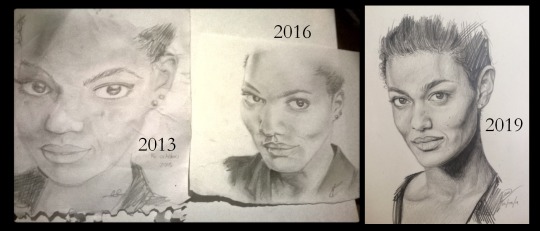
~
Part 3 - Observational drawing
I honestly think that observational drawing was one of the most important things I learnt in my years of art education.
Observational drawing can take on many meanings. Perhaps it’s drawing a still life of a fruit bowl, or a life drawing class with a naked dude in front of you, or even drawing from a photo. The point of observational drawing is to improve how you translate the world around you onto a 2D surface, essentially.
And you don’t need anything fancy to do observational drawing either! Just placing an array of things in front of you and trying to sketch them (try and focus on a mix of textures and surfaces for the objects. So, for example, including a cup along side a woolly hat will help you get a handle on how to create texture with your drawing, and drawing anything with a reflective surface like cutlery is both challenging and interesting to do! Basically just use what you have around you!)
If you’re lucky (or unlucky, depending on how fond you are of seeing naked people lol) enough to have the chance to do life drawing, I would honestly recommend it! Often the final results aren’t great, but it’s a really good way of practising your observational skills! And even if you don’t have the opportunity, just trying to sketch a friend or family member from across a room, for example, is something that can really help you improve!
Top tip: a teacher once told me that when you’re drawing something like a face, for example, a way to improve how you draw is to see the face not as a ‘face’, but instead as a collections of shapes. Because our brains have a preconceived idea of what a face looks like that we end up drawing what we think we can see rather than what we can actually see!
There’s a lot of art snobs who believe that drawing from reference images is ‘cheating’ in comparison to life drawing, Of course, this is bs, and I’d say I’ve learnt just as much from using reference photos for the basis of my art as I have from drawing from ‘real life’. For more information about my thoughts on references and how to use them, see This post!
~
Part 4 - Drawing from references: Tracing, Grids and Freehand (which is best?)
Tracing in the world of art is a ... Contentious subject to say the least. And I’m not really interested in getting into the ‘moral’ implications of whether it is ‘cheating’ or not.
Instead I want to focus on the pros of using something like tracing when you’re starting out. I think particularly if you’re trying to improve how you shade things, colour things or how to get better at blending, then I do think that tracing can be a useful tool! Even I used tracing in the very start of my delve into digital art, but soon found that tracing wasn’t really something that was helping me in the long run so moved onto freehand stuff.
Overall, I think tracing is good as a starting point when you’re still learning about art, and also if you’re not too comfortable with your freehand drawing skills yet. I’d also recommend you mention if you have traced a piece if you share art to social media. Of course, no one is obligated to do this though!
This is an example of an artwork that I traced (it’s from 2013, hence why it looks... like That lol)
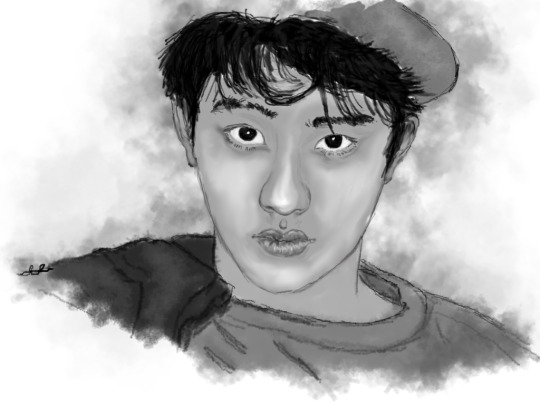
But if you’re someone who perhaps has used tracing in the past and found it doesn’t really work for you, or if you don’t want to start with tracing at all, then a good ‘next step’ I’ve seen other artists get into is using grids.
Now I have to admit, I’m not the best person to talk about grids since I’ve actually never used them lol... But I know a lot of artists who do, particularly people who do a lot of traditional work, since it makes it a lot easier to translate the reference image to your piece of paper or canvas.
And in a way I would recommend grids more for people starting out in drawing than tracing, and this is mainly due to the fact grids force you to use a lot more observational drawing skills than tracing! If you’re interested in getting into using grids I’d recommend doing a bit of research yourself!
The final technique of drawing from references I want to talk about is freehand! Now this is the one I’ve been doing for the majority of my art ‘career’ and honestly is probably the most ‘difficult’ to do of the three techniques.
But I find freehand drawing particularly rewarding with the ways it can make you reimagine an artwork in ways you never intended! Like what I mentioned in my Reference advice post, I have found that making ‘mistakes’ in freehand drawing can actually lead to more interesting and unique works of art than tracing or grid work could ever do!
I also think that freehand allows you to create your own characters or concepts in a much more free way. For example, my Spirit of Somerset piece was something I created from a variety of references (I seem to remember I used Isak from SKAM’s mouth as a basis for the girls’ mouth?) and the dragon was based on a real mishmash of references, which is something that I I feel I couldn’t have done if I’d have been using grids or tracing!
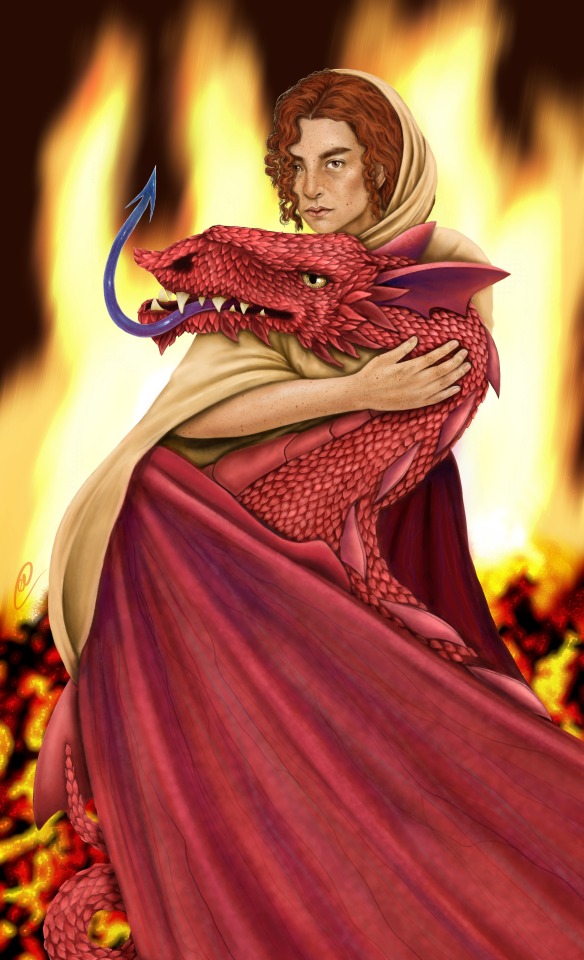
With this I’m not trying to say that freehand is the ‘best’ way of drawing, it is just the one that I personally have found to fit me the best, which is the entire point of this post! All of my advice is just pointers I think could be useful for new artists, it is up to you to find which ‘path’ in art suits you best!
And of course, I’ve phrased these techniques as separate purely for the sake of explaining them easier, but the fact of the matter is that you can use a combination of these in your art if you wish!
If you struggle with drawing the outlines of hands, perhaps use tracing as a way to get a handle of the shape and then maybe use freehand to fill in the colour of them! Use a grid to draw a tree but freehand the leaves and bench below it!
Remember that your art is your art, and no one can tell you how to draw things!
~
I think I’ll leave this here for now! But I may do a part two at some point in the future! & my ask box is always open for anyone who wants any specific advice!
I really hope you found this at least moderately helpful, and a massive thank you to everyone for the constant support of these posts and my art!
#art advice#drawing#drawing tips#art advice for beginners#drawing advice#artists on tumblr#art#i SWEAR i am trying not to ramble in these i just... have a lot to say lol
55 notes
·
View notes
Note
I wish you would write a fic where Tony and kid Peter are being adorable father and son as retribution for the angst you’ve made me suffer through in the past hah! (JK I love you and your angst! 💛)
Well, well, well. What do we have here, eh? A request for adorable? I'm not sure, I'm very good at that 😌
Here's SIMTony who would stop at nothing to help his unwell son, Peter get better. Even if it meant using Extremis.
P.S. ILY3000 💕
In the final throes of the graveyard shift at the hospital floor, the elevator pinged for its frequent lone visitor. The front desk staff, whilst tense and sitting up suddenly straighter, knew not to actually engage. No ID was needed for their boss, one of them barely suppressing a gulp as his determined strides headed for the private room that had been deliberately placed near to the room equipped for every possible kind of emergency. Once inside, he carefully shut the door silently and took a seat at the bedside.
Beep. Beep. Beep.
Sharp blue eyes shifted from the persistent buzzing of the most technologically advanced medical equipment anyone, anywhere could offer before looking back down to something far more invaluable and precious. Tony’s entire world. His purpose in life. The little boy on the bed lay motionless, breathing slowly and evenly, nose occasionally scrunching up at the discomfort of the oxygen mask upon him. He should have been cocooned in a hug from his father but instead his son, Peter, was littered with wires attaching him to the very best modern medicine had to offer.
Beep. Beep. Beep.
Pale, soft skin with the daintiest of freckles stood out against the dark curls spread across the far too big pillow. The small fingers of his left hand had loosely closed around the calloused thumb of his father, letting him know that whilst he had been rendered weak from illness, he was still aware of his comforting presence. Tony’s index finger gently glided across the small knuckles, willing himself to see a tiny curve of the lips on his son’s face.
Beep. Beep. Beep.
This had been the Avengers fault. Peter’s current critical condition. The young boy had been on a school trip when a battle had broken out and the wannabe heroes managed to cause more destruction than lives saved. A chemical explosion had landed most of the class in hospital and many of them had ended up becoming very unwell. Unfortunately for Peter, he already suffered many ailments so even under the wing of Stark’s finest medical personnel, the struggle had taken a toll. The genius shook his head as thoughts of revenge started to sprout from the many seeds that had been planted since the catastrophic incident. He shelved the many ideas he had that would lead to the demise of the reckless group once his kid was better.
It had been hours when the sound of a nurse's footsteps acted as the catalyst that would remove Tony from the room so he could head back to his lab. As he reluctantly moved his hand away, there was no reaction. Not even a twitch from the slender child. Bending down, he tentatively stroked a small amount of the exposed skin that was available on the boy’s face before planting a light kiss on his forehead. By the time the nurse was opening the door to the room to complete the routine checks, any sign of a visitor would be long gone.
The moment Tony was back in his workshop, he strode towards his desk. Music started to reverberate from the ceiling, the sound greatly appreciated compared to the low hum and incessant beeping from the emotionless devices that were currently keeping his son alive.
Tony didn’t believe in a higher power other than himself. So in no way, shape or form was he ever going to accept that he couldn’t save Peter from the incurable illness now ravaging his frail body. Feeling powerless was simply not an option.
Rolling up the sleeve to his top, the genius opened a drawer and pulled out a device meant for extracting blood as painlessly as possible. Not that pain meant much to him these days. No pain would ever compete with a parent having to watch their child deteriorate every single second of every single day.
Satisfied with the draw, Tony placed it into a diagnostic machine of his own making. He caught a glimpse of his reflection in the glass of his workshop, eyeing it like he was in the most intense staring contest of his life. Jaw clenching, his arm shot out allowing liquid metal to glide across his skin before firing a repulsor at the glass and shattering it. There was an element of irony to everyone loving his face except himself in the minimal but intrusive “what if” moments that surrounded his current situation. With a crack of his neck, his arm remained outstretched so the Endo-Sym armour could return to it’s housing tank.
“Boss, the results are back,” F.R.I.D.A.Y. informed as the music lessened in volume. “No adverse reactions detected still. The chemical composition indicates that the Extremis is unchanged in it’s integration with you on a genetic level and continues to remain stable.”
“And the sample from Peter?” Tony asked, confident that he knew what the answer would be.
“Also remaining stable.”
“Alert the staff intending to see Peter following tonight's shift that their presence will not be needed,” the genius demanded as he mentally reiterated the next steps of his plan in his head. Lips curled into devilishly handsome grin at his victory, eyes crinkling at the sides. The smile only softened when his eyes drifted to a framed picture Peter had drawn of the both of them. He’d done it.
“Certainly, boss,” the AI had responded without any acknowledgement. Tony was too busy in thought. Not only was the Extremis flowing through his own veins, leaving him feeling at perfect health. But soon, it would be doing the same for Peter too. Pain free, peak performance and at complete and optimal health.
“Have there been any sightings of the Avengers in the last hour? I feel a splash of revenge is in order for this special occasion?” The holo-screens in front of him started to flicker as social media sites were searched and hashtags refreshed repeatedly. Hulk had been trending within the hour and Hawkeye in the last eleven minutes.
"Well, how about that?" he grinned gleefully. "I really am being spoiled for choice."
Whilst the genius had been certain F.R.I.D.A.Y. had relayed the message to the morning staff, Tony still found himself exhaling sharply at the sight of someone sat by Peter’s side reading his file. The thin bag of Extremis in his hand was shifted into his back pocket as quickly as humanly possible. The good feeling from beating the shit out of one of the Avengers, plus the buzz of providing Peter with a cure that no meagre doctor had been able to, shifted into a tension as tried to work out who it was.
Their face was narrow with sharp features and glasz eyes remarkably penetrating when they met his perusing stare. His black hair had been combed back neatly, the sides of his temples a distinct light grey. The well fitted suit looked designer even for Tony’s impeccable standards.
“Your services are no longer required,” he affirmed with a dismissive flourish of the hands before the man could even introduce himself.
“I’m sorry?” the other man replied without hesitation, closing the file and rising from the chair. Tony’s chair. If he’d been expecting any pleasantries or introductions, he was thoroughly mistaken. Tony was already locked onto Peter, the gentle rise of his chest a welcoming sight as always. He refused to allow his attention to be divided, ignoring the piercing stare boring into him now. “I have an oath to this patient. He critically needs help from the best in all fields. He needs my help.”
The genius turned at that, an eyebrow raised as he looked the doctor up and down. He certainly held himself strongly for someone who had that much audacity in addressing the owner of everything within his current vicinity.
“Are you new around here… Doctor Strange?” He asked disingenuously, eyes narrowing as he scrutinised the name badge. The letters ‘VISITOR - Dr Stephen Strange’ jotted on the bottom, likely the reason he hadn’t got his AI’s memo. The receptionist who let him in would be fired whether it was her fault or not.
“Unlike everyone else in this building, no, I don’t work for you” the doctor shot back tersely. “However, you were so insistent on my consultation that, somehow, I found my diary completely cleared of all surgeries that were booked in.”
“Well, you can now stick them back in your diary. We’re done here.”
“I know this is difficult,” the doctor started, tone suddenly softer as if he were hoping a change of tact would get through. “You brought me in for my expertise, so use them.”
“I’m the most intelligent, capable person on the planet. I don’t need you. I don’t need anyone.”
“Your arrogance surpasses all the rumours and expectations I had of you,” Strange snapped back incredulously. Apparently nothing was going to get through. “Your child is-”
“You know, it would be a real shame if you were to lose your medical licence, wouldn't it, doctor?” Tony sneered dangerously low. This ungrateful little shit was going to get it for not only wasting his time and energy, but also his son’s. An insignificant speck like the rest of the world.
“Are you threatening me?” the doctor replied doing his best to keep his tone cool and unflinching when the other man removed all personal space between them. The lack of intimidation he was feeling only pissed Tony off more.
“Let’s not test my resolve, doctor.” Despite feeling completely wrong about leaving considering Peter’s condition, Dr Stephen Strange tucked the file he’d been reading under his arm and left the room in just a few strides. Tony had spotted the hand diving for a phone as the door shut behind him and clenched his fists in disdain.
“F.R.I.D.A.Y., be a darling and ensure Doctor Douchebag doesn’t make it back home,” Tony demanded followed by a nonchalant sniff.
“Yes, boss. His phone has also unexpectedly lost all signal so will not be usable anytime soon.”
Satisfied with the course of action his AI had taken, Tony locked the door to his son’s room for good measure. He eyed the current equipment before making his move. One of the drips currently providing Peter with much needed medicine was switched to make way for a sample of the Extremis that Tony had meticulously created and tested on himself. He peered at his son, swallowing thickly that this would all be worth it.
Bag secured, the first few drops started instantly, the older man watching as they flowed along the thin tubes before entering the cannula imposed on Peter’s hand. The skin began to glow orange, the lava looking trail gliding all the way up the arm’s before entering the chest. Daring a glance at the monitors, Tony noted an instant improvement in the readouts. A smile spread across his face as sheet-white, sickly skin started to immediately brighten.
Peter’s big, brown doe eyes suddenly shot open as he took a huge gulp of air, eyes landing on his father who was remarkably in focus for the first time in his life without the aid of glasses. Tony removed the oxygen mask so he could take his son’s face in fully for the first time in well over a month.
“Dad?” the young boy croaked, clearly a little disoriented from the abrupt wake up.
“Hey, buddy,” Tony whispered, voice cracking with emotion as he closed the distance between them.
Peter lunged at his father, his small arms wrapping tightly around the genius’ neck and face burying into his chest. It had been far too long since either had been able to enjoy the tender, heart-bursting feeling of overwhelming, unconditional love from one another.
“I love you, kiddo.” Tony gushed as one of his hand’s lovingly cupped the back of Peter's head holding him as close as possible. The other enveloped around his back, his thumb slowly stroking up and down. When the older man's hand started to trail through Peter's hair, the boy somehow managed to burrow even closer. Tony soothingly lifted curls between his fingers and then let them ping back as new life continued to circle through his son’s body.
“I love you too, dad,” Peter whispered, a strain evident in his voice that Tony hadn’t been expecting. When he leant back, he saw the likely cause. Now unnecessary wires were tugging at his child’s skin.
“Let’s get these off you, bud. You don’t need them anymore,” he promised softly as he carefully went to work at removing the monitoring equipment clips and stickers. Peter’s curious eyes followed every step of the way, surprisingly not wincing even when some of the tougher stickers were peeled away. Although he was too young to even begin comprehending what had happened, he knew from vague memories he’d been hurt and that he’d slept a lot. Often he had been unsure if he was dreaming or awake when he’d hear his father read him stories, express his love and let him know how brave he was being. A slight tug on his hand drew him from his recollection as he looked down.
"I’m scared," Peter timidly admitted as he eyed up the last piece of medical equipment attached to him. The cannula in his hand.
“Here’s what we're gonna do, bud. We’re going to put on our brave faces and before you know it, it’ll be all done and over with. Can you show me your bravest, fiercest face?” Tony gently challenged, as part of his upper lip curled and he playfully growled.
The child’s dinky nose scrunched up and his lips pushed out into the biggest pout he could form. He shook his head a little and hummed in a way that likely felt fierce to him but could only be described as adorable to his dad.
"Wowzer. That was super mean, you nearly scared me!” Tony gasped dramatically, as he gestured for the boy to look down and see that the only thing on the top of his hand was a small cotton wool ball and a light pressure from his dad. Using his free hand to fish into his pocket, Tony revealed a green Paw Patrol sticker with Peter’s favourite character, Rocky, on it.
It had been a distant memory since the young boy had handed it to him, having spotted the numerous nicks and cuts that littered his hard working hands after a long day in the workshop. Extremis meant Peter wouldn’t even need it, but the placebo effect would make it worth it.
“Am I all better, daddy?” Peter asked as Tony eyed him up once more. The overwhelmed father cupped his kid’s face and planted another kiss on his forehead, relief washing over him that he was now free from the concatenation of medical instrumentation.
“You most certainly are. And that means we get to skedaddle out of here.”
Before his son could anticipate his next move, his father had scooped him up into his arms and they were making their way not only out of the room, but off of the floor for good.
They’d had a chance to change into matching casual wear and feasted on a huge breakfast before snuggling up on the sofa. Peter had selected an Octonauts movie to watch as he tucked into his father’s side and enjoyed the sound of his steady heartbeat.
It would be a couple of hours when Tony’s phone pinged with a notification he knew was F.R.I.D.A.Y. when she was being discreet. His son huffed at the movement as he shuffled to get the phone out of his pocket, muttering an apology to his kid before opening the message.
[Unfortunate accident on the Hawk’s Nest, Route 97. Vehicle crossed the barrier and rolled multiple times down the cliff’s edge before landing in the Delaware River. Initial scan from one of the Iron Sight Bot #364 shows one survivor.]
Tony’s smirk widened into a full blown smile. Peter’s heart-of-gold eyes suddenly on him, looking up from his position. It was likely a silent protest at the lack of head strokes he was suddenly receiving so the genius replied swiftly.
[Call off any emergency services and get him med-evaced here.]
“You know what I think we need. Celebratory cheeseburgers for lunch,” he announced as Peter let out a squee of joy.
#writer prompt game#thank you for sending this one in!#ill be working on the next over the weekend! 🐸
35 notes
·
View notes
Text
Sonic Villains: Sweet or Shite? - Part 15: DR. EGGMAN
There are some villains I like. And there are some villains I don’t like. But why do I feel about them the way I do? That’s where this comes in.
This is a mini-series of mine, in which I go into slightly more detail about my thoughts on the villains in the Sonic the Hedgehog franchise, and why I think they either work well, or fall flat (or somewhere in-between). I’ll be giving my stance on their designs, their personalities, and what they had to show for themselves in the game(s) they featured in. Keep in mind that these are just my own personal thoughts. Whether you agree or disagree, feel free to share your own thoughts and opinions! I don’t bite. :>
Anyhow, for today’s installment, it’s finally time for him. The bad doctor himself. Gather round ladies and gentleman, for the spotlight is on the arch-villain that shines above them all... Dr. Eggman.
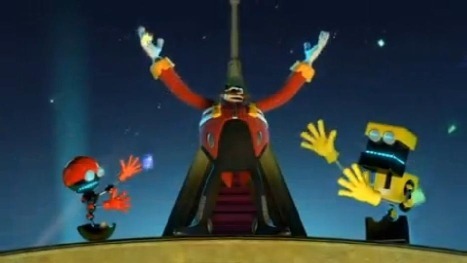
The Gist: It's the dawn of the 90's. A little company called SEGA had an ephiphany. They wanted to make a video game juggernaut that could rival the quality and iconic appeal of the then-unmatched Super Mario Bros, and their current star, Alex Kidd, just wasn't doing it in the way that they hoped. They promptly set about starting anew, as a worldwide phenomenon wasn't going to make itself.
So a gentleman named Naoto Ohshima created a selection of design concepts for this brand new mascot. One of these concepts was President Roosevelt in his pajamas.

Seen here with his catgirl body pillow.
The response to this character was “This is good, but we think kids would prefer kicking the shit out of him”, and so he was given an antagonistic role instead. In the meantime, after juggling the rest of their ideas, they eventually settled on a rabbit hedgehog named Sonic for their main protagonist, knowing his Mickey Mouse-like aesthetic would help endear him to the audience, and the franchise as a whole would have an easier time gaining a DeviantART fanbase later on down the line.
Initially, the character of today's review was but a mere lackey among many, seemingly little more than one of numerous minions working for Sonic's originally intended main villain, the Nonspecific Goblin. He was also dressed as a bee for some reason.
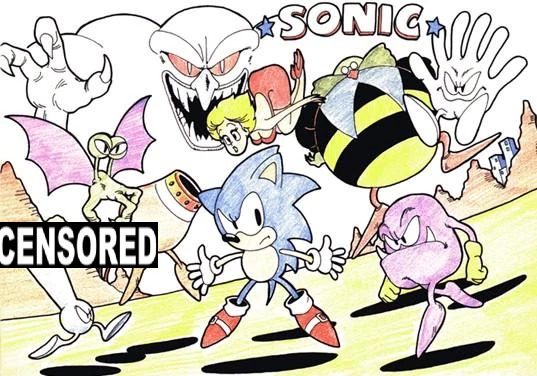
Which is the least weirdest thing in this image.
At some point however, they all got together and decided that actually, the guy with the moustache was the only one worth shit, and so he was upgraded to the role of main villain himself. With a spiffy new attire of red and black, he was given the bold title of Dr. Eggman, because with a shape like that, what else are you gonna call him?
“Funny you should say that”, laughed SEGA of America, as they rebelled like an angsty teen and named him Dr. Ivo Robotnik instead. While this name does make equal sense for the character, as he is indeed a hard worker who also happens to like robots, the reason for this name's existence seems to have been mainly because they thought Eggman was too out there of a name for an egg-like man. Whatever the case, this would confuse a lot of fans for years, and remains a point of divisiveness to this day... Unless you're like me and your first game in the series was Advance 2, in which the manual clears it up right away, and you accept the idea of a character having two names and immediately carry on with your life.
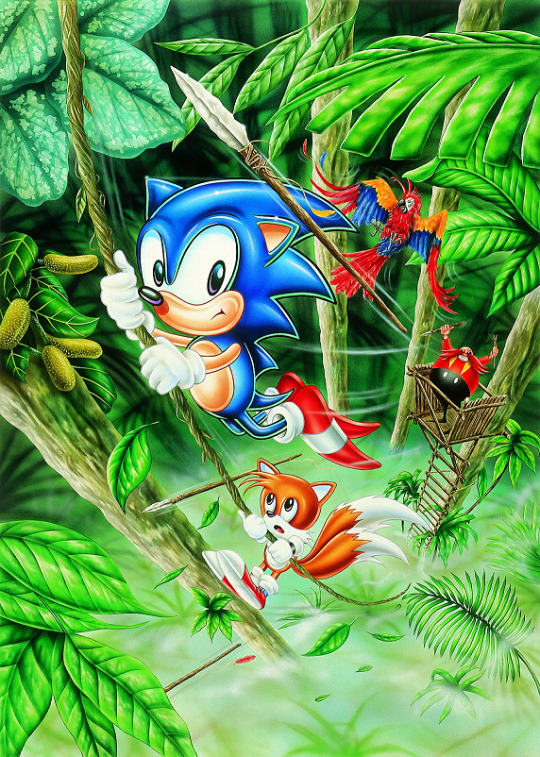
He would have aimed it perfectly if it weren't for the Sonic Heroes Parrot distracting him.
And that was that, really. It didn't take long for them to come up with his characterization, which was that of a cackling fiend with an ego to end all egos. This guy was the Narcissist Alpha, more king than actual kings, no strings attached. Other villains would build statues of themselves, but only Robotnik would deface Ancient Egyptian monuments to improve them with his face. Other villains would think “Nah, refacing all four in Rushmore would look silly”, but only the Eggman, the Eggmyth, the Egglegend, would go “Well fuck you, I'm doing it anyway.” Then he'd do it anyway, and proceed to address to the entire world that he did in fact do it anyway.
It also didn't take long for them to develop his primary schtick. With the dynamic of Sonic VS Eggman, you had a classic rivalry between nature and technology. Interestingly enough however, this turned out to be executed more tactfully than your typical Amish-abiding examples in similar media. Never was technology itself regarded as a corruptive influence that you should never utilise no matter what. Rather, it was only as good or as evil as the person using it, with it just so happening that the villain loved machinery only slightly less than he loved himself, and it was countered by Sonic’s best friend being a techno wiz in his own right anyway. Anyhow, with his machinery, the doctor would make a name for himself among video game baddies by confronting his enemy as the boss of nearly every zone in each game, rather than hide away until the endgame.

And all without a driver's licence.
In his soon-to-be-30 years of activity, he has largely remained the same since his inception. Other characters have been introduced, other villains have came and went, but Eggman has remained THE villain of the franchise, and he's remained a vital part of the Sonic the Hedgehog universe... with a slight redesign along the way.
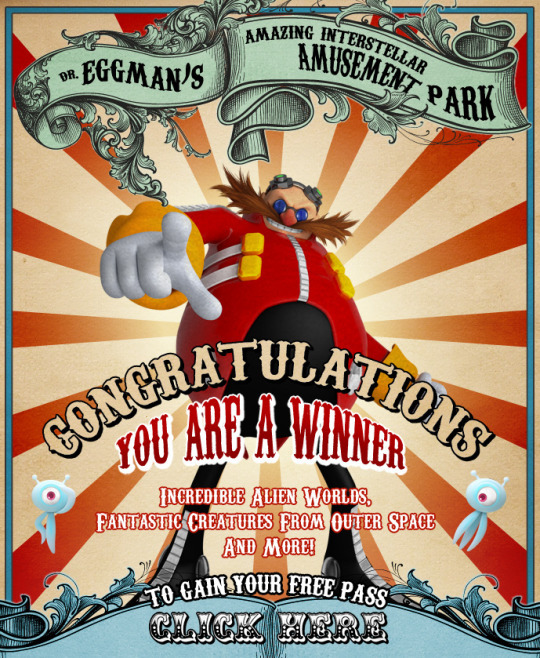
The only ad I don't want to skip.
The Design: Eggman's design may be more simplistic than the likes of Bowser and Ganondorf, and he may not look as openly threatening at first glance, but it's still a very iconic look no matter what look it is. His original appearance was devised so that kids could have an easy time drawing him, which only makes me feel worse about not being able to do it as a grown adult without it looking like a Sexy Legs Kirby.
Still, it's a classic for a reason. With his to-the-point colour scheme, contrasting heavily with Sonic's blue, and his capelet collar resembling walrus tusks, it was an instant winner and made everyone goo goo for g'joob.
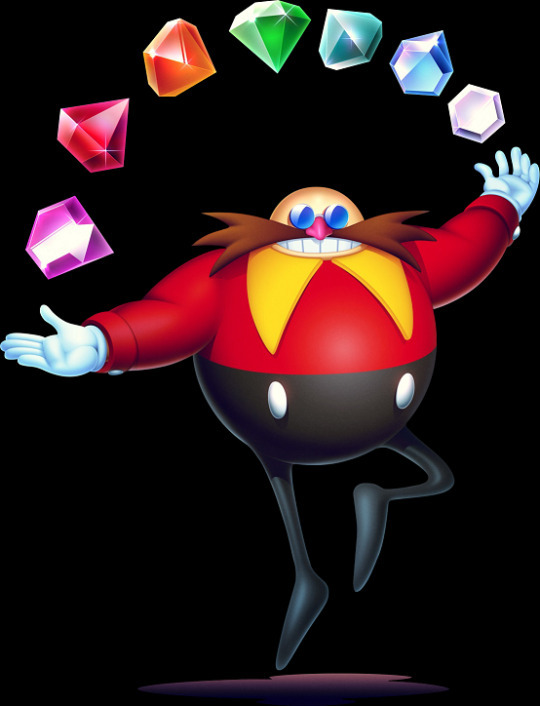
The Emeralds he’s juggling are a metaphor for the divided fan community.
And when it was time to give the cast an update for Sonic's first real 3D adventure (or at least the first one that didn't get axed for being a magic eye seizure), Eggman got a respectable change of his own. He was taller, his getup was militaristic, and his body was more legitimately egg-shaped rather than basketball-shaped. He also gained a pair of goggles that he never uses, except in scenes where he puts them on and then never uses them.
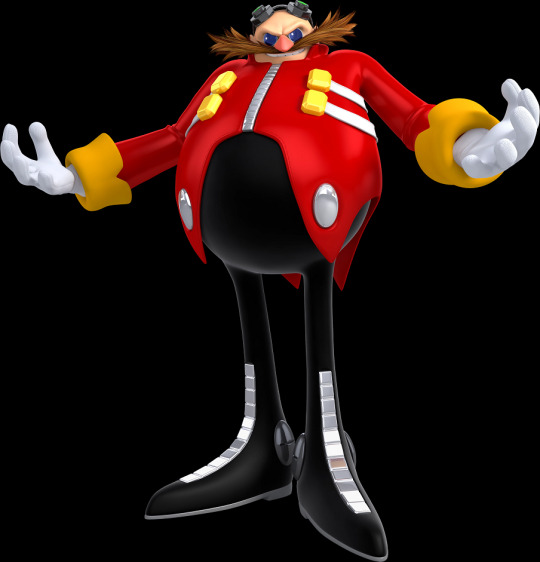
“How do my chicken legs not collapse under the might of my gluttonous mass? Find out in an unrelated tie-in novel that you have to pay additional money for.”
There was also that one redesign from 2006, but...
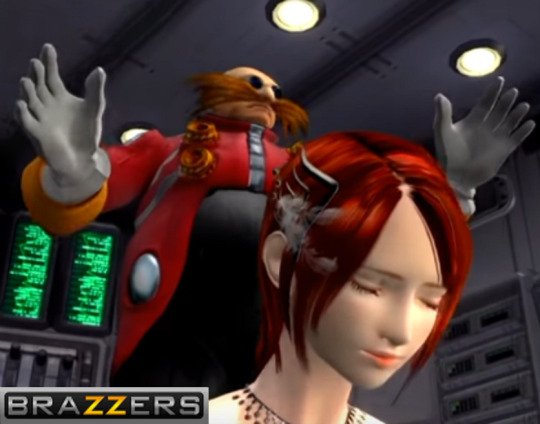
Be it Classic or Modern, I've always loved his design. Before he even says a word or does anything, you know from his appearance that he's a bit of a clownish sort. But he also has a subtle creepy vibe going on, with the way his glasses often obscure his eyes, and how this only makes the pearly-white, unnecessarily wide grin on his face that much more empty and unsettling. This little bit of eeriness hiding among his cartoonish physique reflects the full extent of his character pretty accurately, as we’ll delve into soon enough.
If nothing else, it's more effective than him having no eyes at all.

GRRRRRRRR FUCK YOU BUNNIES THAT I CAN'T SEE
The Personality: If you've seen my villain reviews, then you'll have gathered that Sonic's rogues aren't known for having much in the way of personality. There are exceptions, but they are indeed the exceptions. More often than not though, whether it's an alien conquerer, an ancient monster, or Dan Green the Recolour, they can be summed up thusly: They're evil, they want to destroy the world, and the heroes stop them because they're evil and want to destroy the world. If they're feeling particularly daring, they might go for a second colour.
Luckily, as if to counter all these cardboard drawings, the central adversary of the franchise makes up for these voids of personality by actually having one. And what a personality it is.
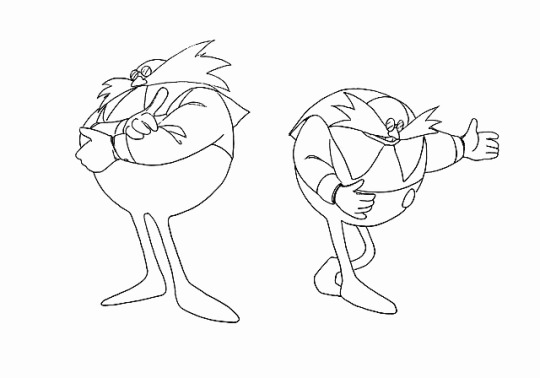
The writers of SatAM looked at this and thought “No, this won't do, there's no character to work with here.”
He really is brimming with comedic charm. Every moment that he's present...
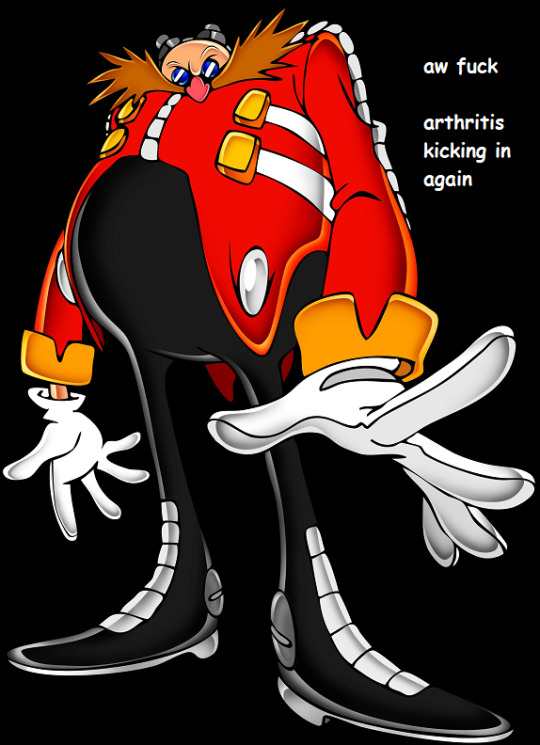
Every moment that he shows off...
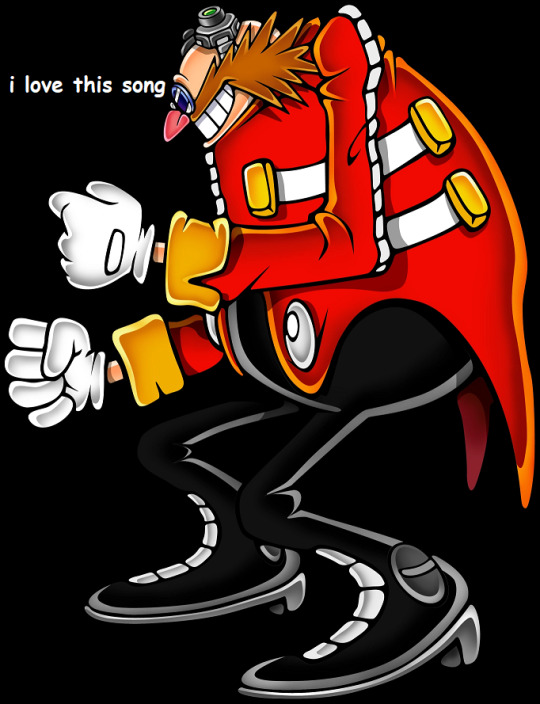
Every moment that he basks in his own glory...
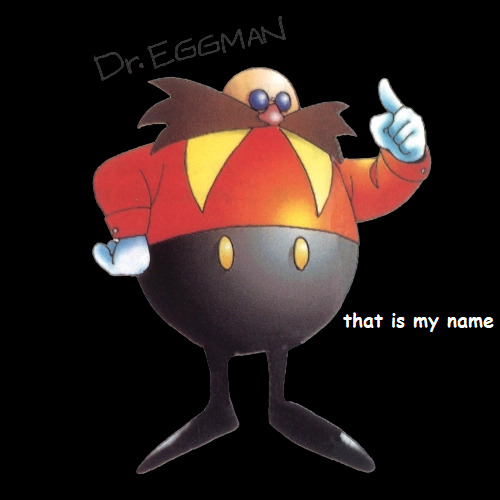
Every moment that he unveils a new wicked scheme...
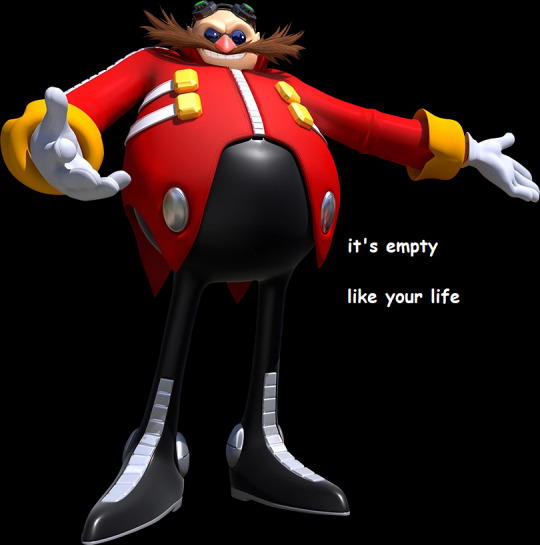
Every moment that he puts his enemies to the test...
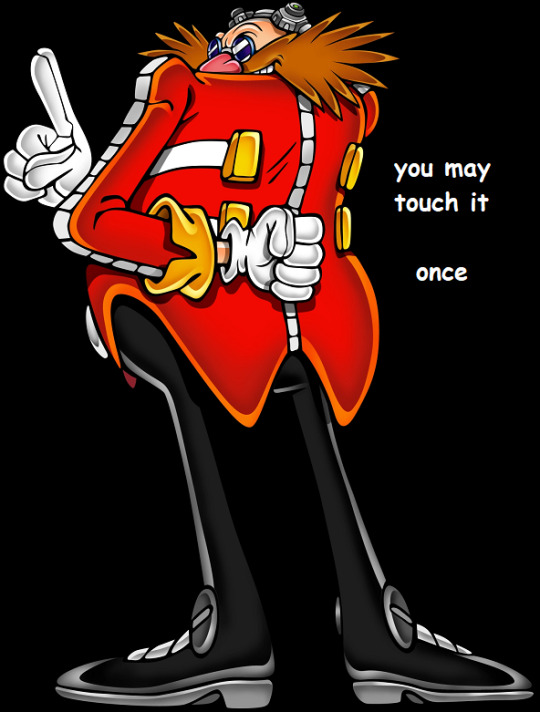
Every moment that he challenges the world...
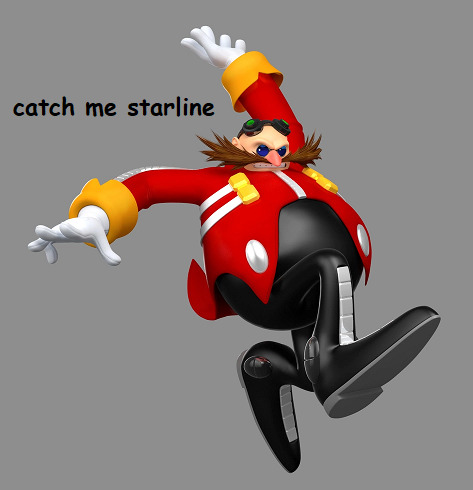
Every moment that he laughs at the world...
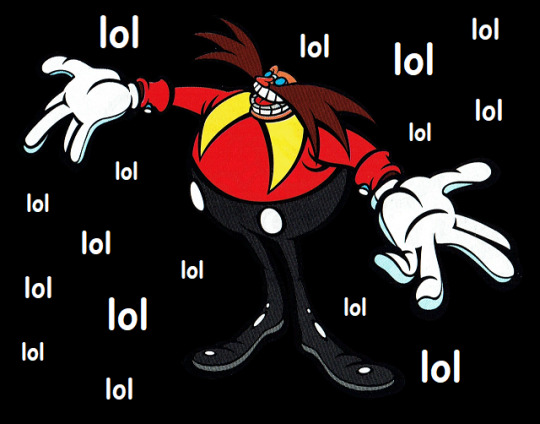
Every moment that he lives, nay, every moment that he breathes...
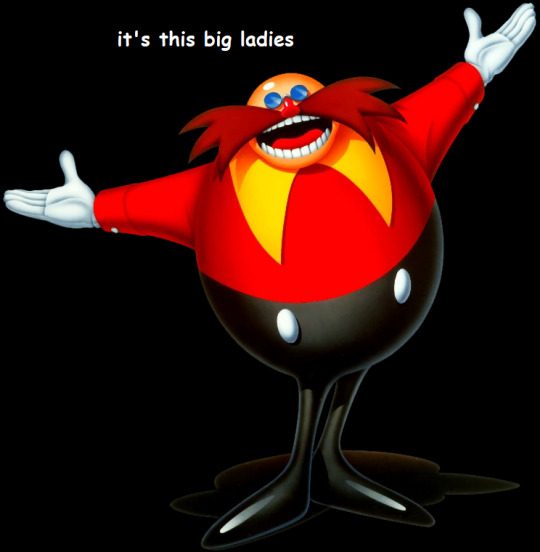
Yes, the man has plenty of humor, and it's part of what makes him so enjoyable and memorable. However, if you think being a clown is all there is to him, then prepare to have your expectations subverted initial assumptions taken in a unexpected direction, because although he puts the goof in goofy, he ALSO puts the “oh...?” in “oh shit”.
For you see, Eggman is by all means the epitome of Laughably Evil, but do not, under any circumstance, take him at face value and write him off as a joke. He is anything but.
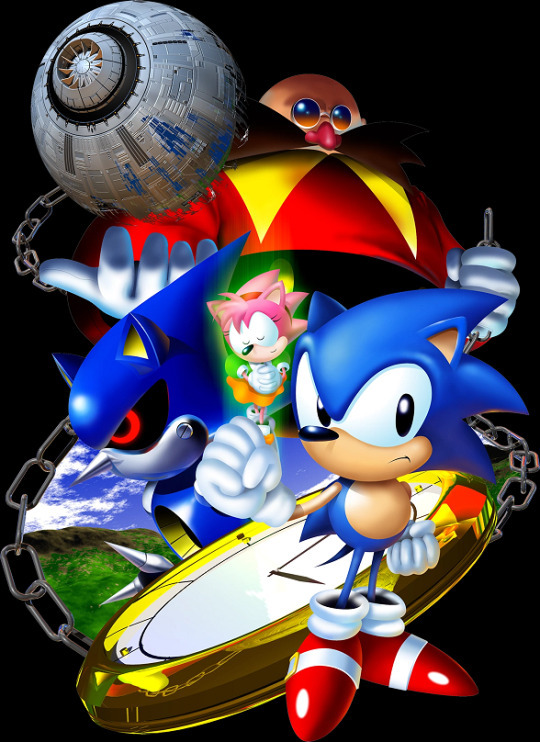
For starters, he can swing a planet.
There is a rule of thumb that I personally go by with Eggman’s characterization, one that I believe is an immediate make or break factor in regards to whether or not you understand what makes this villain work. Eggman - when you put all his secondary traits aside - is made up of two prominent halves. There’s the egocentric meme machine that bounces up and down like a kid with his N64 and laughs like Santa... and there’s the monster buried within that remains completely and utterly unrepentant for everything he’s responsible for. This is very important. Despite the character’s simplicity at his core, many writers have failed to grasp this, official writers included, and I for the life of me cannot understand why this is such a recurring problem. Eggman is funny, AND Eggman is evil. Both are equal. When you take away one or the other, you may have a funny character, or you may have an evil character, but you don’t have Eggman. Simple as.
Armchair intellectuals may argue that Eggman’s deeds aren’t that evil, since he tends to be merely callous rather than actively trying to hurt or kill people. Those people are probably the types on TV Tropes who weigh a villain’s evilness and effectiveness purely through the surface-level scale of their goals rather than what they actually do to achieve them. While it is true that Eggman tends to be more apathetic about the aftermath of his actions, that doesn’t - and shouldn’t - negate how dangerous he is. It shouldn’t negate what he’s capable of. It shouldn’t negate how far he’s willing to go. And it shouldn’t negate the consequences and casualties that can and do result from his many schemes.
Seriously, think about this for a second. If you confronted Eggman about his current plan to... I dunno, make a water park in Africa or some shit, and you informed him that there has been unexpected mass suffering as a result of this, how do you think he would truly feel about that? What do you think he would actually say to that?
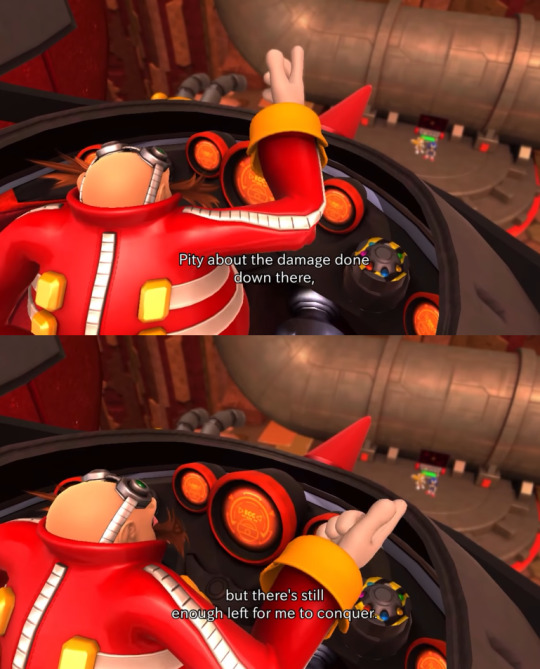
Spoiler: No fucks.
If anything, that he “merely” doesn’t care either way as long as he gets what he wants is more uniquely horrific and deplorable than if he were a generic baddie who committed his evulz specifically for evulz’s own sake and nothing more. At least you’re inadvertently acknowledging that other people’s lives have value when you act one-dimensionally gleeful over ending them, but when your immediate response to the side-effect of a million potential deaths and environmental disasters is “Oh well, fuck ‘em, Eggmanland time baybeeee”, that’s a new level of cruelty.
Besides, even in the Genesis era, he was carpet bombing Angel Island...

“Good thing I have this shield. Sucks to be this forest!”
And he’s only gotten worse since then, indulging in such acts as going full suicide bomber with a missile, after his initial plot to destroy and rebuild Station Square through the means of Chaos and the Egg Carrier didn’t work out...
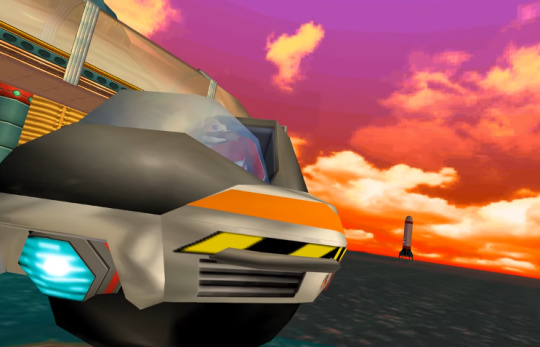
But don’t worry, he kept it lighthearted by making it look like a penis.
Making one of Sonic’s friends go insane with power against their will, forcing the Blue Blur to put them down personally...
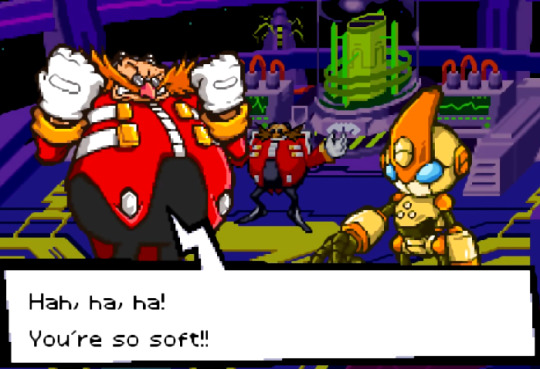
It’s ironic, cause he’s metal. Or do I have to awkwardly explain the joke two more times before I’m a proper YouTuber?
Capturing thousands of innocent aliens, and forcefully converting them into mindless beasts...

I’m pretty sure I saw Alfred Molina conduct this experiment one time.
He even removed the heroes’ collective IQs so that he could shoehorn a cliffhanger on an already terrible game.
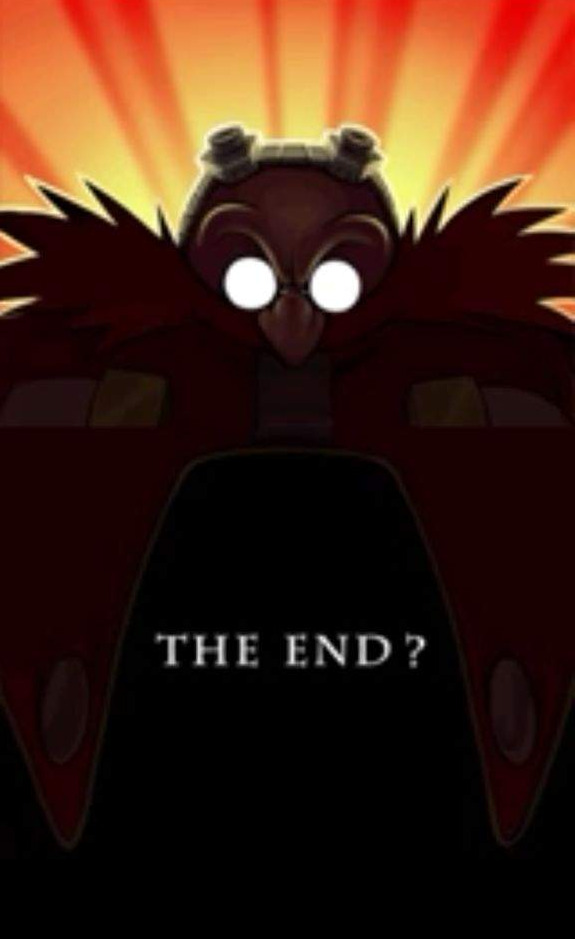
Thanks, cunt.
And honestly? When it comes to Sonic and chums at least, Eggman does let out a more openly sadistic side now and then. Need I mention that time when the doctor forced Sonic and two random buddies to make their way through a trap-infested island of his own creation? Not for the sake of nabbing Chaos Emeralds or anything of the sort mind you, he just wanted the blue motor mouth to suffer.
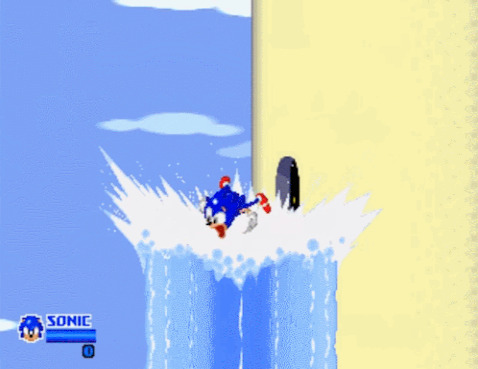
Images you can hear.
To make matters even worse, as befitting of his manchild tendencies, he’s ridiculously petty. How petty? Petty enough to abduct a little girl’s mother for no other reason than because Cheese completely trivialized his forces the girl was friends with Sonic and helped participate in the latest kicking of his own ass.

He only picked Vanilla because there was no Strawberry.
But at least his captives can admire the sheer variety that their captor has to offer. One of the greatest things about the doctor's style is that anything goes. With all due respect to Bowser, he tends to stick with his fiery castles (although he has been branching out recently), and plenty of other villains in gaming tend to be similarly stuck in their ways when it comes to tastes. Eggman, on the other hand, will create all sorts of fortresses and reside anywhere on the planet and beyond. It can be in the sky, in space, somewhere hot, somewhere cold, under the sea, in a circus... and every now and then, he might combine some of them together and thensome. So long as it's even vaguely mechanical in some way, his ground rules have already been ticked off.
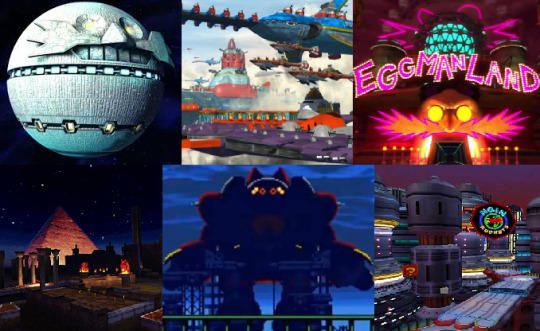
Hang on a minute...
You know what else Eggman is? Relentless.
Persistence is a quality that most villains by their very nature share, lest they cease to be an effective antagonist. But once again, Rrrrrrrobotnik maxes out more than any other, and will often go to insane lengths to keep the current plan going, or if not that, then to spite Sonic.
Exhibit A: Sonic 3 & Knuckles, in which the grand finale consists of the madman throwing a gravity-shifting contraption your way, busting out a Kaiju-sized robo, escaping with the Master Emerald after his defeat, continuing to escape even after the Death Egg has been thoroughly destroyed, getting chased through the asteroid fields in space by Super Sonic, and only finally going down when the escape craft and the piloted mech controlling the escape craft are down. And all of this came after a grand adventure where, among other things, he destroyed an entire level just to kill you.
There are immortal omnipotents that put up less of a challenge.
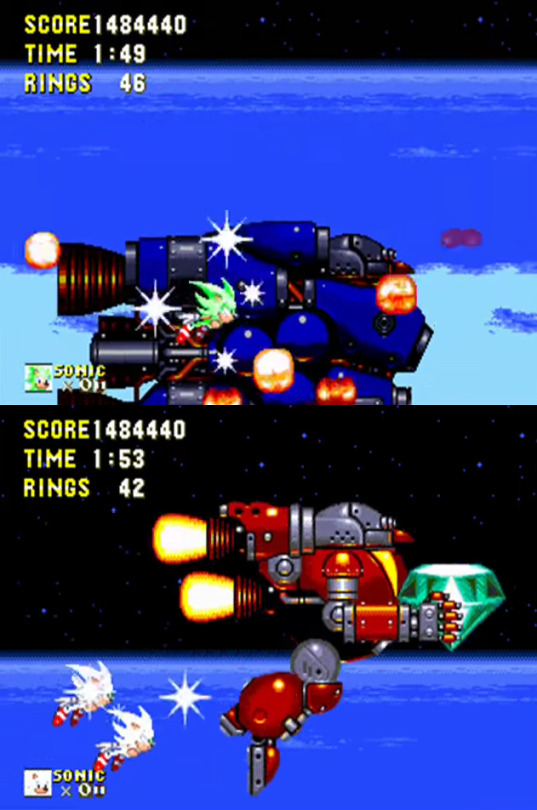
“Looks like it’s time for Plan... *checks paper*... F.”
His relentlessness also reveals another side of the doctor that is simultaneously admirable and terrifying: He bows to no one. No one. Doesn’t matter who it is. Doesn’t matter how powerful they are. Doesn’t matter how much the odds are stacked against him. If another villain were to demand that he cower before them, the scientist would laugh and show through physical demonstration that this is not the way the egg rolls. Unless he’s absolutely unable to do so, he will give it his all every time, and even if he can’t, he’ll use his crafty mind to find some other way to get around the issue. You can beat him in battle, you can foil his plans, but you absolutely cannot break his resolve.

“Dad said it’s my turn to play with the Ruby. I know this, because I’m your dad.”
What about his relationship with those who actually serve him? Specifically, his own robots? Well for the most part, he treats them like absolute crap, what with verbally abusing them at every corner and being all too willing to go full Vader on them the moment they mess up. He IS capable of expressing fondness and giving praise to his more successful creations, like with Metal Sonic and Gamma, but even then, it’s a roundabout way of praising himself, since he’s the one who made them what they are. So basically, you’re only valuable to him if you make him look good.

Gaming in the Clinton Years in a nutshell.
And as for Sonic? Yeah, like with any legendary and long-lasting hero/villain dynamic, it’s obvious that Eggman has some degree of begrudging respect for his opponent. But if you think this respect would dissuade him from actually going through with his ambitions of rulership...

As the hedgehog’s apparent demise in Sonic Adventure 2 proves, as well as his defeat at the hands of Infinite and the subsequent six months of brutal conquest in Sonic Forces, Eggman is dead serious about his goals. If you think he’d get bored after conquering the world, he would simply expand his resources and have a crack at conquering the rest of the universe. When he says he hates that hedgehog, I’m inclined to believe that he means it, and although he may enjoy his “games” with Sonic to an extent, I also can’t see him wanting to remain stuck on square one forever.
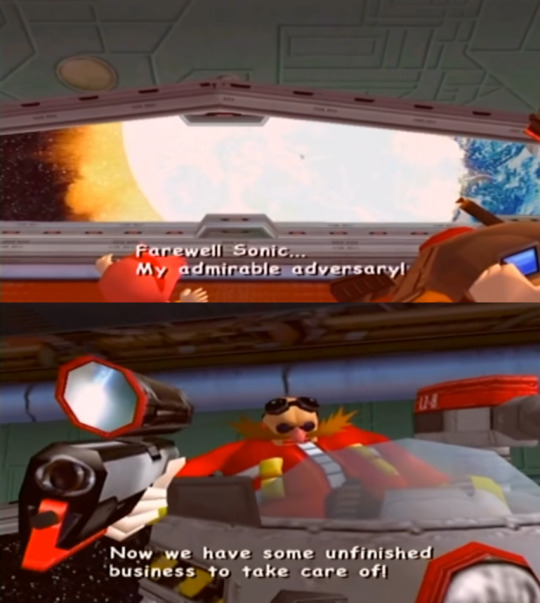
If this were Sonic X, he’d just grieve.
By the way, the scene above? Undeniable proof that for all the doctor’s boasting, he’s not actually lying or exaggerating when he prides himself on his brilliance. Because when you get past his goofy exterior, when you look beyond the occasional, relatively minor mistake (*glares at IDW*), you’ll see that... yes. He IS brilliant. And not just in the science department either, although his countless robots and strongholds over the years are no doubt a testament to his credentials there. While he may prefer to go in big and bold, he can also be shrewd with his strategies when he wants to be.
Sonic’s aforementioned near-death experience, for example, was the result of Eggman turning the heroes’ own cunning plan on its head by being one step ahead of them. And in Sonic Unleashed, he lured his enemy into a trap, culminating with him cancelling out Super Sonic.
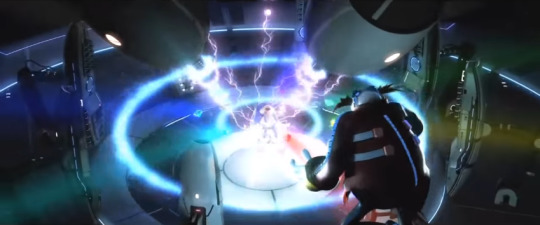
“...and pay the price for your Werehog gameplay...”
And after all those years of struggling, he finally got a giant monster under his complete control. “But he had help!”, you say? Yeah, from himself.
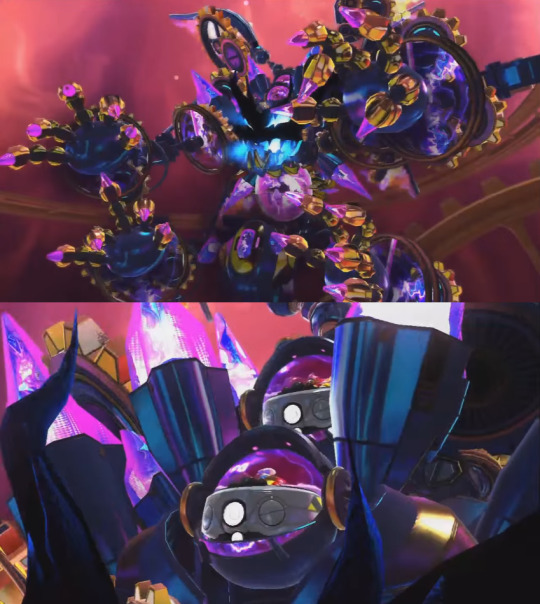
Did Flynn sleep through all this...?
Much like his inner nature as an evil bastard, Eggman's effectiveness is likewise commonly underestimated by writers. Yes, he occasionally makes mistakes. Yes, he occasionally overlooks details. Yes, he occasionally lacks foresight. But he is NOT stupid. A hero is only as good as their villain after all, and if Eggman is portrayed as a bumbling fool, then how can Sonic be a truly great hero? Eggman is humorous, sinister, and when the chips are down, competent.
...Did I mention that he's also a master Olympian?

The Execution: There's no surprises here. You knew from the moment you saw this review that my stance wasn't going to be anything less than 100% fanboy adoration. In that respect, this section almost feels redundant, because there's only so many ways I can say “Dr. Eggman is the fucking shit and I'm eternally grateful to Mr. Ohshima for bringing this absolute masterpiece into our world” without it getting repetitive. So to cap this review off, I'm going to very briefly compare his portrayals in other media, and explain why they tend to not be as good as the original SEGA Eggman.
“Cause they’re not balanced, right?” you ask. “Cause they veer too far in a particular direction? You're so predictable,” you add. To that I say:
1. Yeah, basically.
2. ...S-Shut up...
3. While the conclusion may be obvious, it's nonetheless important because as I mentioned previously, despite how straightforward this villain is, writers seem absolutely intent on not getting the point. There are loads of villains out there who share Eggman's talent of mixing hilarity and evil together with a bow of competence on top. Two of those villains are among the most famous supervillains of all time, in fact. You might have heard of them.

Joker can do it just fine. Green Goblin can do it just fine. And plenty of others can do it just fine. So why is it such an issue with Eggman? What is it about a round body and a long moustache that gets people to think “No, this guy is absolutely incapable of being comedic and threatening at the same time, no question, end of.” Is it because he’s a more cartoony franchise? Well, that can't be the case, because even Mario has a couple of beloved examples. Fawful, anyone? How about Dimentio? Cackletta? King Boo? K. Rool? Hell, you could even count Bowser himself depending on the portrayal.
Anyway, the point is, writers tend to miss the mark for one reason or another. With Sonic X for example, he wasn't too bad in the beginning, but as the show went on, he became exactly the toothless non-villain that many people misjudge him as. We all know that scene where he berates Black Narcissus for harming their captives (not for pragmatic reasons mind you, he genuinely took issue with the act on moral grounds, even though his own hands weren’t exactly clean either), but even before that point, he was doing such things as healing an injured Sonic without an ulterior motive, not taking any opportunity whatsoever to start conquering Sonic's world because he was pining for Sonic's attention, and being the Jiminy Cricket to Chris Thorndyke's Pinocchio. Why they thought the goddamn villain should be the moral conscience of this show remains an unanswered question, but at least it no longer influences how he's portrayed in the games.
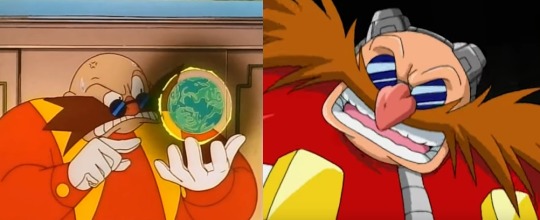
Then you have the IDW comic, which is a similar tale of starting off decent and then careening wildly into the abyss, but for different reasons. Initially, he was built up to be in-line with his competent, foresight-packed self from Forces, with his inevitable return being met with dread, and a delightfully devilish scheme to match when he finally did so. But somewhere along the way, Ian Flynn thought that Eggman coming back from his amnesiac period and returning stronger than ever with a new minion and a deadly virus wasn't enough to up the stakes... so they decided to “up the stakes” by turning both the doctor and his new minion into massive imbeciles so as to justify their plot getting hijacked by the Deadly Six, a move so predictable yet infuriating that it got even me to turn against the Six. And the reason the Six got invited in-universe is because Starline decided he didn’t like being unique and devolved into Snively 2.0 behind Eggman’s back. All this from the alleged “best writer” for the series...
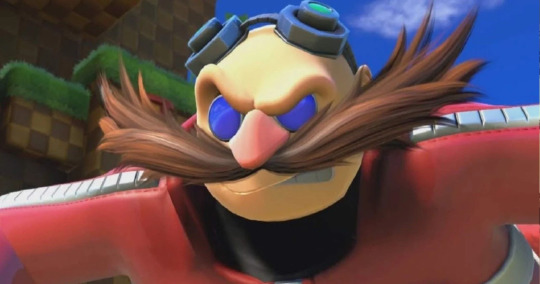
Yeah, same.
And then you have the Boom version, which shares basically the same issues as Sonic X but in a more mundane fashion. It's easier to dismiss because it's a comedy-centric show and his redesign makes it easier to separate him from mainline Eggman, and I'll gladly admit that he does have a lot of genuinely funny lines that redeem him a little bit. But yeah, too much of not being a true villain for my tastes.
Now this isn't to say that there haven't been portrayals in other media that are up there with the original. The versions that I consider better off than the ones above include...
- The OVA Eggman is pretty faithful all things considered, aside from his romantic feelings for Sara, which feels slightly off since the idea of Eggman loving anyone other than himself is incredibly unrealistic at best. But it doesn't actually soften or undermine his deviousness, so I'm willing to let it slide for an alternate take. Especially since he gave us the best Metal Sonic out there.
- AoStH is far from a perfect show, but there's a reason why even its detractors tend to treat its version of Robotnik like a national treasure. Admittedly most of that is because of the legendary Long John Baldry and the endless memes associated with this incarnation, but despite hailing from a comedy-focused show like Boom Eggman, this Robotnik still had a lot of legitimately dangerous moments, more than you'd think.
- And of course, Jim Carrey's Robotnik in the Sonic movie is just... *chef's kiss*
So obvious aesop though it may be, but you see what the more effective portrayals have in common, I assume?
Granted, this also isn't to say that SEGA Eggman himself has had a perfect track record. The decade's worth of upstagings and backstabbings by other villains should be enough of a counterpoint to that claim, and I've also made it clear now and then that I take issue with certain games regarding what they do with the doc, no matter how revered they may be by other fans. Sonic Adventure 2, for instance. I praised the fake emerald scene, and I do sincerely believe that he has a number of other badass moments in that game, but because Shadow was playing him like a fool the whole time, I can't help but have a bitter taste in my mouth when I look at the bigger picture.
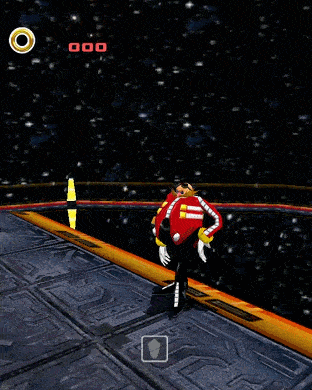
So close to greatness, yet so far...
So in that case, which game do I think has Eggman's best showing overall? That's not in any way an easy question, but lack of dialogue aside, I'm gonna go with Sonic 3 & Knuckles again, as the classic journey through the sights of Angel Island plays out in a way that highlights just how determined, ruthless, and underhanded he is with carrying out his mission to revive the Death Egg by any means necessary. Other games do win out in other areas - SA1 for how bastardly he is, Forces for how cunning he is, Colours for his hilarious announcements, CD for using the scenery to show the effects of his actions, Mania for not letting the other villain walk all over him - but for the purest essence of the doctor at his cartoony yet competent best, I'd say S3&K is a reasonable bet.
And when it comes to all his many traits, which one do I find the most special one of all? Well again, far from easy to answer, but I think the coolest aspect about him is also one of the most overlooked. Robotnik, despite whatever superhuman qualities he may occasionally unveil, is for all intents and purposes a regular guy with a big brain. This might make him appear unimpressive when compared to your average Final Fantasy villain and the like, but if anything, it paints him in a more flattering light than expected, because he doesn't even need to be on their level to still be on the radar. It's easy to be a big bad threat when you're an ancient demon or an almighty god-like being, and you only have to wave a hand to cause armageddon. But when you're just Some Guy™ going up against superpowered opponents, meaning you have to earn your threat level the hard way, and you prove to be a challenge every step of the way regardless, because you're just THAT much of a genius... that's fucking awesome, no other way to put it.
And you know what else is awesome? You may not like Eggman, and you don’t have to like him, but like it or not, he is directly and indirectly responsible for a vast majority of the coolest and most loved moments and aspects of this franchise.
The opening to Unleashed? Eggman set up the scene.
Shadow running around and continuing to be part of the franchise? Eggman released him.
Blaze getting involved with Sonic’s world and continuing to be part of the franchise? Eggman’s half-responsible for that.
Metal Sonic? Eggman made him.
Egg Dragoon? Eggman.
Big Arm? Eggman.
Monkey Dude? Eggman.
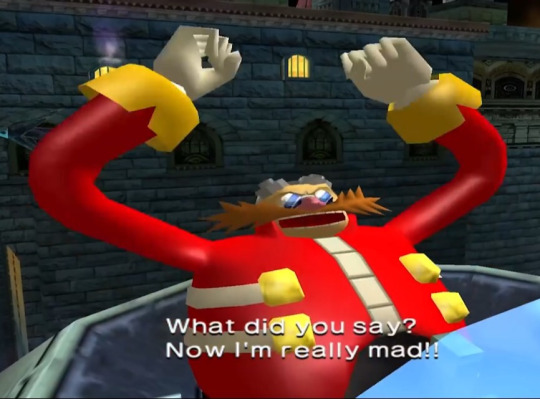
That text is missing a blue checkmark.
This review is probably longer than the echidna family tree in Archie at this point, so I better finish it off. If it wasn't obvious from all the paragraphs I've belted out in this post, I'm very passionate about Eggman and the way he’s portrayed. Ever since I got into the Sonic franchise in 2003, I immediately took a liking to the doctor, and to this day, he remains not only my favourite Sonic villain, my favourite Sonic character, but also my favourite character period. Some may find it a weird or lame choice compared to other, “better” characters, but that's the way it is, and I ain't about to change it. I am very unlikely to ever stop enjoying the hell out of this villain, and even if he got irreversibly ruined in some way, I'd still continue to love what he was before that point.
Because yeah, he's not the deepest character ever, but... who cares? Is it not enough that we find something that appeals to us? When I got into Sonic, I was introduced to fantastic games, a likable cast, high quality soundtracks, beautiful worlds, numerous friends on this very site, and of course, the lovely treasure that is my partner. I may not have been with this franchise during the 90's, but it's given me just as much fun, nostalgia, and happiness as those who were. Despite the flawed titles, despite the fandom conundrums, I still love this series.
And I still love this absolute prick.
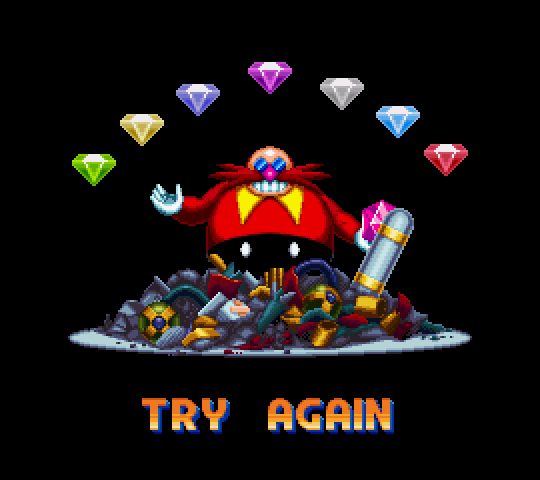
Crusher Gives Dr. Eggman a: TWO Thumbs Up!
97 notes
·
View notes
Note
1/2 Hi there, I have a question about the whole RoL-copaganda thing. I really hope to phrase this right because I don't mean to offend anyone, especially not you - you're such a reasonable voice in this fandom, that is why I think you can give me some kind of answer that helps me out of my confusion. So. In real life, I find police highly problematic to say the least (kinda depending on the country to a certain extent, but in general I think a higher percentage of people with problematic views
2/2... Choose this career path). So I am no apologist of police. But I do enjoy some cop shows/books about cops. I have also enjoyed quite a few productions that glorified mafia, murder etc. (e.g. peaky blinders) where the bad guys are painted in a very favorable light even though they do horrible things. I'm just not sure anymore - is that the same? Is it not? Why, what are the differences? Is it okay as long as I can (or try to) separate my media consumption from my political views?
Sorry this has taken me a while to answer; I’ve been wrestling with what exactly to say.
What this comes down to for me is that while fiction is not reality, and we all read and enjoy fiction about things and people we wouldn’t condone in real life, we also can’t escape that fiction reflects and shapes expectations about the world. That’s why representation matters in media, and that’s why, as has been expressed more eloquently by others, fiction that shows the police as an ultimately positive force in society and police officers as heroes makes it easier for people to accept real-life police violence.
Rivers of London strives to show police who do belong to their communities, do have noble motives, and do make a difference, but it is not exempt from that effect. It’s not the big things; it’s the small things, the way Peter as a protagonist strives to do good and intends to do good and still ends up involved in multiple deaths of suspects that the story sets him up to not be responsible for.
I managed to come to grips with this by watching and very much enjoying a movie over the weekend where a lot of people get killed in frankly morally dubious scenarios. It didn’t make me sad and anxious to engage with, the way fiction with police as protagonists does right now, because it was so clearly removed from real life and expectations for everyday behaviour. That’s the key for me around fiction about police right now, that the behaviours which tend to be excused in fiction are hurting people right now, every day, and getting excused in real life too.
So...I guess my only answers are firstly that you get to decide what you engage with in media and when and why, and you get to do it on the terms of how it makes you feel. I’m not swearing to never read a book with a police protagonist again; it will just play differently when I do. But in the meantime, I’m going to read and watch some stories that don’t reinforce those assumptions.
And secondly, that the problem is not so much any individual work as patterns. If all the media you’re consuming is reinforcing these ideas...that’s probably not great? But it’s also fundamentally a problem with the media. And I think we’re best served as a society, not by interrogating people over what they read or watch and whether they feel Bad Enough about it, but asking why we keep getting the same stories offered to us as options.
58 notes
·
View notes
Text
Does Sessrin Contain Grooming?
A while ago I had responded on a fairly long thread about sessrin vs another slightly similar ship in an adult show, my points being two-fold: 1) the elements of sessrin that reflects grooming behavior, and 2) the effects of this relationship on a child audience vs when it is portrayed in adult media. Since that thread was so long, and mostly buried as it was posted around the time nothing I was posting on tumblr was showing up due to a “glitch” I had decided to repost the second point about the effects of relationship portrayal on children in the media they consume.
However, I figured since I’m reposting that, I might as well repost the first portion of my argument also. This argument has of course been made previously by other members more articulate then I, but what the hell, it might be an interesting read for some regardless. The post will follow under the cut.
While the relationship does not follow the letter of the definition of grooming (there is no way it can considering the small amount of content this relationship contains in the canon material. These two were side characters, and we don’t get a lot of inner reflection from either party.) It does contain a lot of cardinal flags of potential grooming that someone viewing a relationship dynamic like theirs from the outside irl might pick up on, and make them consider intervening.
This is a very reasonable thought process to have, because we ARE all looking at this relationship from the outside. Just as if many of us were to see this same scenario play out in our lives we would feel concern. I have a 9-year-old nephew, were there currently an 18 to 19-year old person in their life today, that 6 years from now were to become a romantic partner, I would understandably have concerns (lol I’m being mild here, lets be real, I’d flip my shit).
Part of the reason us real humans feel this concern is that sexual relationships between adults and children/teenagers under the age of consent IS ABUSE, full stop. That’s why there are laws. (That’s why Onision knows the age of consent for every state he’s in to try to skirt those laws.)
Now here’s an interesting tidbit: in the UK where the age of consent is 16, if an adult is in a “position of trust” the age of consent for teenagers under that trust is raised to 18. 'Position of trust’ is a legal term that refers to certain roles and settings where an adult has regular and direct contact with children. Examples of positions of trust include:
teachers
care workers
youth justice workers
social workers
doctors
There is more information about this law here. Following is a direct quote from the above article:
“Even if the parties feel they have a ‘genuine relationship’, safeguarding experts still consider it to be an abusive one, simply because it is an unbalanced power relationship and the adult is the abuser because they are abusing their power, authority and position.”
This is because when an adult is in some capacity of authority over a child, they are in a position to guide the way that child thinks, their world-view, their opinions, even when the adult isn’t intending to by the sole virtue that the child might look up to, or admire said adult.
So bringing this back to the limited screen time we have to work with of Sesshomaru and Rin, and the interactions they had we can already identify some key factors here: Sesshomaru was an adult, and Rin was a child, even if Sesshomaru did not outright take on the title of caregiver to Rin, Rin still followed him, listened to instructions given to her by him the few times he gave them, and Rin greatly admired and looked up to her “Lord Sesshomaru”. He had power and authority over her, and she showed a genuine desire to make him happy. This is a power imbalance. This means that even if Rin were to be the one to initiate sexual advances, Sesshomaru should not reciprocate them.
This applies by the way even though Sesshomaru left Rin in a human village and she was raised by humans, because she still spent time with him in her formative years. Whether he likes it or not, whether we like it or not, the fact of the matter is Sesshomaru had a hand in developing the woman that Rin would later grow up to be. Entering into a sexual relationship with her is abusing that power he has over her, whether he means to or not.
11 notes
·
View notes
Text
Love’s a game, wanna play? A meta-analysis of the game of love and Taylor’s love of games
—
Before actually getting into this, I’m obligated to make the disclaimer that this is just my interpretation of some songs. I’m not claiming to be “right” about anything. I have no way of knowing whether my observations will hold true if/when Taylor releases more music. It doesn’t really matter. There are many ways to interpret music.
Games are not the only extended metaphor in her discography; if you understand one, you don’t necessarily understand them all. This essay is an exploration of how one particular metaphor could be so effective.
In addition, I am often the first person to say that “not everything is that deep.” Yet here I am, making something deep. I was only mildly curious about this metaphor at first. In the process of documenting my understanding, I surprised even myself as I realized how rich this metaphor is.
A warning…this essay is very long. (It’s either mildly interesting or completely ridiculous and nothing in between. Likely the second.)
—
The notion of a ‘game’ is often conflated with the notion of adversarial conflict. This misunderstanding is largely due to Western structural/cultural forces. Mathematicians and economists have a passion for framing most predicaments as zero-sum, or strictly competitive, where one player’s advantageous move by definition disadvantages their opponent. But collaborative and otherwise not strictly competitive games exist too.
Taylor’s fascination with games spans her entire discography. Artistic preoccupation is reason alone to analyze her work from such an acute angle. But pleasantly, Taylor also does not share the academics’ favorite pastime. She strays away from the zero-sum bias in very unpredictable ways. In fact, she has no bias. She prefers to mix and match her language to each situation as she sees fit. Her convolution of love and games is expressive, divorced from the logical framework by which games are defined. I think examining this facet of her work with a fine-toothed comb may be especially illuminating.
It seems counterintuitive to argue that games could (or should) be anything more than Taylor’s favorite metaphorical manifestation of logos. Yet revisiting a metaphor is itself communication, conscious or not. Advancing an understanding of this extended metaphor, in my opinion, substantiates what is usually intangible about Taylor’s songwriting brilliance.
On Games
Precocious and perceptive, Taylor has, for as long as she’s been writing, placed competition, strategy, and collaboration alongside conflict. Therefore, for the sake of coherence and relative brevity, analysis is scoped only to songs with significant mentions of games, puzzles, or game-related imagery. ‘Games’ are not conflated with general fighting, trickery, toying, revenge, mention of rules/strategizing, or winning/losing. ‘Puzzles’ are not conflated with disorder; puzzle pieces must be pieces of a larger, vivid picture.
Consider football. Imagery of high school football makes “Miss Americana & The Heartbreak Prince” fair territory. Someone shouting over a football game in a bar does not qualify “Mean.” The football helmet worn in “Stay Stay Stay” is an absurd and compelling detail in context, as likely to be fictitious as it is true, and hence more significant than a televised sporting event; “Stay Stay Stay” qualifies. In essence, games are interesting as a device rather than a simple detail.
Below is a list of the songs with significant game reference(s), categorized by implied type. Note that a song can belong to multiple categories if it contains multiple references.
Generic/unspecified games: “Come in With the Rain”, “Dear John”, “State of Grace”, “Blank Space”, “Wonderland”, “…Ready For It?”, “End Game”, “Look What You Made Me Do”
Card games: “New Romantics”, “End Game”, “Cornelia Street”, “It’s Nice To Have A Friend”
Dice games: “Cruel Summer”, “Miss Americana & The Heartbreak Prince”
Board games: “Dear John”
Sports/contests: “The Story Of Us”, “Long Live”, “Stay Stay Stay”, “End Game”, “Miss Americana & The Heartbreak Prince”
Puzzles: “Red”, “All Too Well”, “So It Goes…”
Other: “It’s Nice To Have A Friend”
Like many people, Taylor habitually seeks structure to manage unpredictability. (Games provide structure for situational volatility, hence her artistic love affair with this metaphor.) The stylistic choices she makes to entertain this habit, however, are anything but consistent.
The games have a variety of different players, such as in “Dear John” and “Look What You Made Me Do.”
She does not establish strict parity between characters’ emotional affiliation and the competitiveness of a game. “Dear John” features an adversarial game. Conversely, her partner in “Blank Space” is a co-conspirator/collaborator. “All Too Well” analogizes autumn leaves as puzzle pieces; puzzles are collaborative games.
Taylor famously claims that love is a game in “Blank Space.” This song is colloquially understood to be about the love story we see play out in the media. Games can thus include all parts of her ‘love life.’ Arguably, she foreshadows this in “Long Live” by intertwining parts of her ‘America’s sweetheart’ image with professional success, which is derived from writing about love.
Taylor is not always a player in a game, such as in “Cruel Summer.” Her partner may not be either; see the crossword in “Red.”
In short, humans are unpredictable, as is love. It is clear that Taylor uses games as an incredibly powerful metaphorical device. They are a genuine reflection of her feelings about love.
Musical analysis usually begins with careful consideration of each track. Given a disparate and lengthy list of songs, it is probably more fruitful to go up a layer of abstraction. Of particular intrigue for this set of songs is the relationship between time and Taylor’s willingness to divulge more information about a metaphorical game.
We revisit the set of songs to list them in chronological order. The purely ‘generic’ songs are now bolded: “Come in With the Rain”, “Dear John”, “The Story Of Us”, “Long Live”, “State of Grace”, “Red”, “All Too Well”, “Stay Stay Stay”, “Blank Space”, “Wonderland”, “New Romantics”, ”…Ready For It?”, “End Game”, “Look What You Made Me Do”, “So It Goes…”, “Cruel Summer”, “Miss Americana & The Heartbreak Prince”, “Cornelia Street”, “It’s Nice To Have A Friend”
Specificity about a game seems to decrease with proximity to the 1989 era.
Lyrical imprecision in “Come in With the Rain,” a true outlier, probably boils down to youth.
“State of Grace” is a preamble about the themes of Red. “Begin Again,” though much later on that album, shares the same inspiration as “State of Grace.” Red is constructed as a sandwich between these two songs which present the album’s thesis. The album considered as a whole is thus a buffer for 1989.
reputation is a buffer for 1989 because the ‘generic’ game songs are heavily and intentionally front-loaded.
“New Romantics” is a coda for 1989, and its poker game reference is slightly ambiguous. What, exactly, is poker; what is all in the timing? The thematic material of “New Romantics” is most similar to that of “Blank Space.” ‘It’ is the same crude game played in the earlier track, the affair of collecting men. Perhaps this close relation subsumes “New Romantics” under the ‘generic’ game category. (Though this is a loose explanation.)
There exists an undeniable chronological pattern to game characterization. If you graphed the amount of game-related lyrical obscurity versus time, it would look like a shallow sand dune with the tip at the 1989 era. (Or a hill. Or a big pile of leaves. You get the picture.)
Armed with a basic understanding of Taylor’s career, one might say that her desire for personal privacy manifests as reticence to define metaphorical games. The 1989 era was the height of media attention on her. This caused more than a few issues. The art created around this time would have naturally reflected how she felt about the public eye. (See: the entire reputation era.)
But isn’t Taylor almost as famous as ever today? Sure, her name is not as saturated in the zeitgeist as it was in 2014. She’s still one of the world’s mega-stars. And does she not have a very private relationship today? Taylor’s work reflects her hardened personal boundaries, but boundaries alone do not explain the pattern of how she writes about games. Otherwise Lover would be filled to the brim with songs about ‘generic’ games.
To summarize, Taylor uses games as a perennial favorite metaphor to frame her experiences of love. Increased public scrutiny undoubtedly changed the way that Taylor approached songwriting; even so, fame was not a factor that changed how she wrote about games. The connection between time and types of games suggests that we cannot consider game metaphors in isolation.
On Love
The next piece of the puzzle (no pun intended) is what she shares about love. Which 1989 songs are most revealing? Technically…most of them, if you think hard enough. I’d like to draw special attention to “Wonderland” and “You Are in Love.”
Ah, “You Are in Love.” The musical gift that keeps on giving! Fitting, because true love should be too.
In “Wonderland,” Taylor says:
It’s all fun and games ’til somebody loses their mind
Shortly thereafter in the “You Are in Love” bridge, she proclaims:
You understand now why they lost their mind and fought the wars
And why I’ve spent my whole life trying to put it into words
Taylor reverses her opinion about the prospect of losing her mind for love. (The abruptness here is a consequence of a real-life relationship change, plus the fact that both of these songs are bonus tracks.) Of course, she also tells us an important connection between love and games.
I’ll pause here to say that I’m not going to turn this into a (frankly uninteresting) relationship timeline/proof post. But may the profound significance of “You Are in Love” and its subject never escape us.
“You Are in Love” is written in the second person. Taylor is the intensely guarded ‘you.’ We witness her emotional walls get broken down by her lover, the ‘he.’ Fascinatingly, Taylor departs from the second person point of view in the bridge. Suddenly, she alerts us to the presence of an ‘I.’ The bridge says that ‘you’ Taylor, whole and normal-person-in-a-relationship Taylor, finally understands true love. In the same breath, ‘I,’ writer Taylor, admits that she’s had it all wrong for years. (This is not to say that her writing pursuits before this moment were pointless.) Therefore, breaking the second person point of view to include the ‘I’ line shows that Taylor distills the nature of true love in that ‘eureka’ moment.
Yet she exposes the schism of writer Taylor and whole, normal person Taylor in a moment where, in theory, those two roles could not overlap more. Taylor has every reason to faithfully represent her feelings. Her sentiment is always sincere even though she may falsify details of a story. “You Are in Love” is (as far as I’m aware) the only song in which Taylor ever blatantly admits to writer-person misalignment. The schism must run extremely deep.
Taylor was—and surely still is—drawn to songwriting as a means to explore love. She tries to to capture its enigmatic essence with the written word. How fascinating it is that, at the very moment she communicates her deepest understanding of love, she says that the part of her that puts it into words is inherently disconnected from her spirit which feels it.
On Games And Love
We must briefly table the meta-implications of “You Are in Love” to return to the topic of games.
Love probably would have stopped feeling like a game after finding a real gem of a person who doesn’t mess with your head. (Love also probably would have stopped feeling like a game after dialing down on brazen PR tomfoolery.) Taylor has written several albums about her true love. It’s easier now to trace the arc of her feelings: it is a positive path, as anyone would predict.
Why would she continue to write about games after 1989? The obvious answer is that she likes doing it. It remains a useful metaphor.
But recall that chronology discourages us from considering metaphorical games in isolation. To clarify the principal function of the game metaphor in her discography, we must consider the writer-person dichotomy.
First, note that Taylor exposes the writer-person dichotomy in an honest, vulnerable moment. She confirms it as a human phenomenon. The phenomenon thus must extend beyond a singular moment during 1989. Distance between writer Taylor and whole, normal person Taylor—a measure henceforth called writer-person distance—is necessarily a function of time. Coincidentally, so is the measure of game-related lyrical obscurity.
Writer-person distance can grow or shrink. It was small in her youth; this is what pushed her into songwriting. It is small now, as she has told us in the albums since 1989 that true love has stitched her back together. Again, because writer-person distance is a human phenomenon, it changes slowly, smoothly. (“You Are in Love” simply marks the biggest distance.) Does this sound familiar? If you graphed writer-person distance versus time, the graph would look like a shallow sand dune with the tip at the 1989 era. (Or a hill. Or a big pile of leaves. Once again, you get the picture.)
To summarize, game-related lyrical obscurity and writer-person distance are smooth functions. “You Are in Love” is the inflection point of both measures.
With “Wonderland” and “You Are in Love,” Taylor tells us that games are linked to how she conceptualizes love. But not just any love. 🎶 True love. 🎶
At the same time, Taylor presents “You Are in Love” as a dividing line between ‘that which is a best attempt to understand something that inherently cannot be captured’ and ‘that which refines the thing that, against all odds, was captured.’ Our interpretation of games must synthesize an abrupt ‘eureka’ moment with both the measures’ gradual changes.
If we are to talk about metaphorical games, we also must talk about true love. But we know that if we are to talk about games, we also must talk about time. Vital to uniting these ideas is the revelation that Taylor conceptualizes the nature of true love as the nature of time. For doesn’t time define what is gradual and abrupt?
The most important line in “You Are in Love” is when Taylor finds it—‘it’ being love. A literal ‘eureka’ moment. This isn’t just a one-time coincidence.
Writer-person bifurcation clarifies why the game metaphor is surprisingly effective. As Taylor revisits the convolution of love and games, the metaphor morphs in tandem with her innate understanding of love.
Some Good Old-fashioned Song Analysis
Observing how games, love, and time are intertwined requires that we reject purely literal interpretations of game-related lyrics after “You Are in Love.” Of course, literal interpretations are still generally useful, even correct. Games are literal, so references to them should be interpreted as such. Also, lyrics about games are probably Not This Deep in reality. We didn’t have to do all this work to realize what songs might belong in conversation with each other; identifying lyrical callbacks would have been sufficient. Treating game lyrics as purely literal limits how we might decipher a recurring metaphor. Without the notions of game specificity or writer-person distance, we would lack a framework with which to fully interrogate how these songs are are connected (i.e. through time). And, after all, the ultimate goal is to understand why the game metaphor is so successful. But, I digress.
(We’ve also made it this far and we might as well keep going. Another couple thousand words…don’t threaten me with a good time, amirite?)
To observe how games, love, and time are intertwined, I propose the following rule of thumb: A game reference before “You Are in Love” is Taylor’s description of love, whereas a game reference afterwards is a pointer to past instances of that game. Such a reference is metaphysical, or more appropriately, meta-lyrical. If she’s referenced a game already, she knows how to use that reference again. If she introduces a new reference, she’s planting it for future use.
We can group the songs after “You Are in Love” by game type:
Generic/unspecified games: “…Ready For It?”, “End Game”, “Look What You Made Me Do”
Dice games: “Cruel Summer”, “Miss Americana & The Heartbreak Prince”
Card games: “New Romantics”, “End Game”, “Cornelia Street”, “It’s Nice To Have A Friend”
Sports/contests: “End Game”, “Miss Americana & The Heartbreak Prince”
Puzzles: “So It Goes…”
Other: “It’s Nice To Have A Friend"
Analysis requires precision. We should pare down the duplicates, if possible.
“It’s Nice To Have A Friend” is tricky because it’s naturally sparse. “Video games,” for example, are more than a simple detail: they are an essential part of creating a childhood vignette. “Twenty questions” and the card game “bluff” function analogously in the later verses. The brilliance of this song lies in how Taylor illustrates the development of companionship and intimacy. The verse about marriage is the most significant verse because it reveals the meaning of the whole song. Thus, we may take the bluff to be more important than twenty questions, which is more important than video games. “It’s Nice To Have A Friend” ultimately belongs in the card game category.
Central to the pathos of “Miss Americana & The Heartbreak Prince” is the “stupid” dice game lyric. Of equal importance is the portrait of Americana, painted with lyrics about Friday night lights. This song truly belongs in two categories.
At the end of “…Ready For It?” Taylor fires a starting pistol, letting ‘generic’ games begin. “End Game” follows and we assume it must pertain to the same game. So Taylor intentionally places this song in the first category. The hook has lyrics about a varsity “A-team,” though this is probably just a nod to Ed Sheeran. The other truly interesting game-related lyric is the one about bluffing. Thus, “End Game” also belongs in the card game category.
Here’s the new list:
Generic/unspecified games: “…Ready For It?”, “End Game”, “Look What You Made Me Do”
Dice games: “Cruel Summer”, “Miss Americana & The Heartbreak Prince”
Card games: “New Romantics”, “End Game”, “Cornelia Street”, “It’s Nice To Have A Friend”
Sports/contests: “Miss Americana & The Heartbreak Prince”
Puzzles: “So It Goes…”
Each of the four obvious groups of songs illustrate a different way Taylor weaves the natures of true love and time together:
Déjà vu: “So It Goes…”
Hindsight/wisdom: “…Ready For It?”, “End Game”, “Look What You Made Me Do”
Fate: “Cruel Summer”, “Miss Americana & The Heartbreak Prince”
Progress: “New Romantics”, “End Game”, “Cornelia Street”, “It’s Nice To Have A Friend”
Déjà vu
The puzzles category only contains one song, making it easiest to analyze. The namesake of “So It Goes…” is Kurt Vonnegut’s Slaughterhouse Five, famously constructed like a mosaic. Puzzles are central to the meaning of this song.
“All Too Well” contains the first instance of a puzzle metaphor in her discography:
Autumn leaves falling down like pieces into place
Taylor calls back to “All Too Well” in the chorus of “So It Goes…”
And our pieces fall
Right into place
Get caught up in the moment
Lipstick on your face
By referencing a previous song using identical phrasing, Taylor creates the illusion of a sudden ‘déjà vu’ moment. The effect is similar to “You Are in Love,” where she reaches sudden enlightenment.
Sonically and lyrically, the “moment” she gets caught up in is implied to be the one in which she gets lost in passionate sex. The déjà vu moment could be this moment, but it doesn’t have to be. Déjà vu is agnostic to the present in the sense that the feeling can be triggered in the strangest of times. The déjà vu moment is whatever prompted her to write this song.
This game lyric connection clearly shows how a moment of love is defined by a moment of time.
Hindsight/Wisdom
The bombastic group of singles, “…Ready For It?”, “End Game,” and “Look What You Made Me Do,” sets the tone for all of reputation. The ‘generic’ games in these songs are the same as those in 1989, particularly the crude (and, in Taylor’s case, often interchangeable) games of celebrity and dating. In “Blank Space,” Taylor spells out in gory detail what she does as an agent in the celebrity dating game. She does not explicitly define the rules of that game, though. It remains sufficient for her to prove that she knows how to play by them. (Musically, this is far more interesting.)
We know that the reputation singles’ literal proximity to 1989 indicates Taylor’s direct emotional response the previous era. The consequences of a ‘fall from grace’ underpin the entire reputation era. Therefore, Taylor uses lyrical connections from reputation back to 1989 to illustrate hindsight. She tells us what she learned from her mistakes and what she wished she would have done differently.
But first, she gets to be salty about it. In “Look What You Made Me Do,” Taylor laments the fact that she participates in public games to appease others. (Because, really, withdrawing from the celebrity circus would immediately solve a lot of her problems. Alas, megastardom is a Venus flytrap.)
I don't like your little games
Don't like your tilted stage
The role you made me play
Of the fool, no, I don't like you
Let’s return to “Blank Space” for a moment. Taylor’s boyfriend in “Blank Space” is considered a co-conspirator/collaborator with her in the celebrity dating game. Central to our understanding of that song, however, is the unequal power dynamic. Taylor is the strategic mastermind, whereas her boyfriend is just along for the ride. The two are on the same team, but they are not equals.
Taylor actually leans further into the games of the 1989 era in “…Ready For It?”
Baby, let the games begin
Unlike in 1989, her partner is an equal on her team:
Me, I was a robber first time that he saw me
Stealing hearts and running off and never saying sorry
But if I'm a thief, then he can join the heist
And we'll move to an island
She then connects “…Ready For It?” to “End Game”
Baby, let the games begin
Are you ready for it?
//
I wanna be your end game
Both Taylor and her partner are forced to play the same game and they share share the same goal. Her partner’s “end game” is Taylor; thus, Taylor keeps her true love by beating the celebrity dating game. They have to work together to achieve this difficult task.
Though the celebrity dating game is not true love, it impacts Taylor’s relationship with anyone who could be her true love. In hindsight, Taylor realizes how media games blew up in her face. It is wisdom—to keep her relationship private, to dial down on PR tomfoolery, to prioritize her happiness—that helps her pre-empt these problems for the reputation era. And indeed we understand the love story of reputation as the lovers’ prolonged attempt to hide from the public eye.
Hindsight comes with the natural passage of time. One only accrues wisdom, however, when they apply the lessons of hindsight to make better judgements about the future. Games again unite the ideas of love and time; they elucidate how Taylor uses wisdom to protect someone she loves.
Fate
“Cruel Summer” and “Miss Americana & The Heartbreak Prince” highlight the elegance of the meta-rule of thumb.
The dice game in “Cruel Summer” is a unique incarnation of the game metaphor because Taylor doesn’t confirm whether she is directly involved in this game:
Devils roll the dice
Angels roll their eyes
What doesn’t kill me makes me want you more // And if I bleed you’ll be the last to know
The song doesn’t reveal much about the nature of the dice game other than the fact that it is competitive. It could be a fitting description of what is going on in Taylor’s personal life. It may not be. What is more important is that Taylor positions herself as collateral damage of the outcome of the game.
This is also the dice game’s first appearance. By our rule of thumb, this lyric exists only to be a link to “Miss Americana & The Heartbreak Prince.”
“Miss Americana & The Heartbreak Prince” belongs to two different game categories, sports/contests and dice games.
First, dice games. We get a few more answers about the nature of the “Cruel Summer” competition:
It's you and me
That's my whole world
They whisper in the hallway, "she's a bad, bad girl"
The whole school is rolling fake dice
You play stupid games, you win stupid prizes
It's you and me
There's nothing like this
Miss Americana and The Heartbreak Prince
We're so sad, we paint the town blue
Voted most likely to run away with you
Both Taylor and her partner are forced to play the dice game by virtue of being metaphorical students. As a disgraced and about-to-be-vagrant prom queen, Taylor has finally realized that winning the school’s dice game is not worth the price of a ‘fall from grace.’
Next, sports/contests. With the understanding of these lyrics as pointers to her previous songs, sports/contests harkens back to “The Story of Us,” “Long Live,” and “Stay Stay Stay.”
“The Story Of Us” suggests that a shared quality of sports/contest metaphors is that conflict is nuanced, even hidden to outsiders:
This is looking like a contest
Of who can act like they care less
In “Stay Stay Stay,” football is connected to (for lack of a better word) violence, conflict that could result in emotional and physical harm:
I'm pretty sure we almost broke up last night
I threw my phone across the room at you
I was expecting some dramatic turn away
But you stayed
This morning I said we should talk about it
'Cause I read you should never leave a fight unresolved
That's when you came in wearing a football helmet
And said, "Okay, let's talk"
Finally, “Long Live” blends the ideas of small town Americana with Taylor’s personal and professional life:
I said remember this moment
In the back of my mind
The time we stood with our shaking hands
The crowds in stands went wild
//
I said remember this feeling
I passed the pictures around
Of all the years that we stood there on the sidelines
Wishing for right now
We are the kings and the queens
You traded your baseball cap for a crown
When they gave us our trophies
And we held them up for our town
And the cynics were outraged
Screaming, "this is absurd"
'Cause for a moment a band of thieves in ripped up jeans
Got to rule the world
The backdrop of “Miss Americana & The Heartbreak Prince” is not just any part of America. The juxtaposition of idyllic parts of American life with frictional, violent, yet sometimes subtle forces tells us that the song’s backdrop is an American culture war. It is conflict which unsettles everyone, but by nature hurts only some.
In totality, the function of the dice game metaphor is to position Taylor as collateral damage of an American culture war. (Chew on that one for a bit.)
Again, we probably could have surmised this by examining the lyrics closely. The song lends itself to being a signpost in the Lover chronology. It seems too autobiographical to be anything different. We all remember 2016.
However, “Miss Americana & The Heartbreak Prince” sticks out like a sore thumb from the album’s theme of “a love letter to love itself.” Revisiting games as a glue between love and time expands on the purpose of “Miss Americana & The Heartbreak Prince” in Lover.
The “Cruel Summer” bridge contains this lyric understood to be about her true love:
And I snuck in through the garden gate
Every night that summer just to seal my fate
Taylor identifies “that summer” in the 1989 era as the moment which she sealed her fate. Implicit in this confirmation is her perspective from the future. She is looking back on 1989 from the time when her terrible fate has just been realized.
The moment of realization is—you guessed it—the chorus of “Miss Americana & The Heartbreak Prince.” The chorus depicts post-prom queen defamation. Taylor is aware of every single action (many, probably deliberate) that helped her achieve royalty. She never divulges them. The song is scoped only to the time when she lives her fate.
We usually take observations about fate and love to describe how two souls are bound to each other. Taylor does not tell us much about her lover in “Cruel Summer” sans the fact that the shape of their body is new. Paying special attention to games reframes “Miss Americana & The Heartbreak Prince” within the Lover theme as a commentary on fate. However, the emphasis of fate should not be on her lover. The dice game connection tells us that Taylor views “that summer” in the 1989 era as the time when she sealed her fate as collateral damage in the American culture war. From the “love letter to love itself” perspective, the moral is that passion and excitement can make lovers forget the immutability of individual destiny. If you are fated to be with someone, both of you are at the mercy of whatever the world has in store for the partnership and you as individuals.
Progress
An eclectic group of songs shares a reference to bluffing in a card game. The game metaphor beautifully stitches these songs together into parts of the same story.
The first and most detailed description of the card game is in “New Romantics”
We're all here
the lights and boys are blinding
We hang back
It's all in the timing
It's poker
He can't see it in my face
But I'm about to play my ace
A bluff in poker is an attempt to trick one’s opponent into thinking one has a better hand than they do in reality. The opponent may call their bluff and challenge them to prove their hand is as good as they advertise.
Bluffing requires deception, often telegraphed by facial expressions. Here, Taylor says that she is good at bluffing because she doesn’t let her façade crack. She is not truly bluffing, though, because she possesses an ace, presumably part of her even better hand. Her opponent has called her perceived bluff to prompt to her to reveal the ace.
The opponent, “he,” behaves as though Taylor is bluffing. Taylor, strategic as ever, is prepared to counter by revealing the most powerful card. We should thus interpret this metaphor as the ‘bluffer’ exceeding expectations. (Remember that the first instance of a metaphor is a base case, so we must take its meaning more literally.)
Likewise, in “End Game” and “It’s Nice To Have A Friend”, Taylor is the bluffer:
You've been calling my bluff on all my usual tricks
//
Call my bluff, call you "babe"
However, “Cornelia Street” allows room for the interpretation that both Taylor and her lover are bluffers:
Back when we were card sharks, playing games
I thought you were leading me on
I packed my bags, left Cornelia Street
Before you even knew I was gone
But then you called, showed your hand
I turned around before I hit the tunnel
Sat on the roof, you and I
Taylor may have also been a trickster: “then you called” could refer to the lover calling Taylor’s bluff.
The recurring bluff metaphor coincides with progress or forward momentum in a relationship.
Recall a previous discussion of “New Romantics.” We defined the “it” which is “all in the timing” as a reference to finding romance. “New Romantics” is set in a club with a dance floor, boys, and blinding lights. It’s the kind of setting conducive only to landing one-night stands. Taylor plays games with someone in the club, but exceeds expectations for the outcome of that game. What was flirting or courting becomes something more serious than a one night stand (i.e. an actual relationship). The act of calling a bluff in a card game engenders (relationship) progress. Yet again, what is intrinsic to time is intrinsic to love.
This observation fits with each song.
reputation charts the development of Taylor’s relationship, but the card game bluff in “End Game” is at the beginning of the album. That’s exactly why this lyric works so well. Her relationship is still new, nonetheless significant, after 1989. Her verse mixes these ideas:
I hit you like bang
We tried to forget it, but we just couldn't
And I bury hatchets but I keep maps of where I put 'em
//
And I can't let you go, your hand print's on my soul
The “End Game” bluff represents how Taylor goes from wanting a steady relationship to wanting everything.
You might be able to see where this is going. “It’s Nice To Have A Friend” is the ‘discographical endpoint’ of the bluff metaphor. The verse about marriage delivers the song’s emotional punch:
Church bells ring, carry me home
Rice on the ground looks like snow
Call my bluff, call you "babe"
Have my back, yeah, everyday
Feels like home, stay in bed
The whole weekend
Notice, however, that the bluff metaphor occurs after the implied wedding. This is actually a beautiful sentiment. Intimacy, trust, and commitment are ongoing; growth doesn’t stop with a ring on a finger. The bluff, which represents delivering on promises and exceeding expectations for love, powers the relationship forward.
All signs point to the “Cornelia Street” bluff as the one that may have led to marriage.
Back when we were card sharks, playing games
I thought you were leading me on
I packed my bags, left Cornelia Street
Before you even knew I was gone
But then you called, showed your hand
I turned around before I hit the tunnel
Sat on the roof, you and I
So emotionally charged is this scene that we have to wonder what, exactly, Taylor’s steady partner could do to make her (1) walk out if she were being led on and (2) come back so quickly.
The most intriguing detail about this card game is that both parties may have been bluffing. The lover is leading Taylor on, but Taylor does not stay to call the bluff. She leaves. Usually in poker, one would not want their opponent to be able to prove the bluff with a good hand. (Think back to the ace in “New Romantics”.) But what if both players are on the same team at the end of the day? Calling a bluff is now setting oneself up for potential disappointment. Taylor walks out because she is frightened by the mere possibility of being let down.
Taylor is also bluffing, but her lover doesn’t let her walk away so easily. They pull out all the stops and concede their hand in a desperate attempt to get Taylor to turn around from the tunnel. It works. By our understanding of the bluff metaphor, the lover exceeds all of Taylor’s expectations. The events that transpire on the roof presumably are when Taylor reveals her own cards.
The topic of marriage fits with this emotionally charged scene. Of course both lovers would tiptoe around the topic and be scared to reveal their true feelings.
So following the bluff metaphor helps us follow the course of true love. Calling and revealing a bluff is the catalyst for Taylor’s relationship. However, it also is the nature of time which underpins progress.
I concede that interpreting the bluff metaphor as the catalyst of a story makes it vulnerable to any truth-fuzzing. Perhaps Taylor hasn’t ever written about a real-life engagement or marriage. We have no way of knowing. We instead should take comfort in the fact that her lyrics are beautiful and music is open to interpretation.
On Writing
Our beliefs about love are bound to change over time. As a writer, Taylor is in a unique position to capture this change by revisiting a metaphor.
Take “It’s Nice To Have A Friend.” The song is written as a series of vignettes to define the qualities of love that remain consistent while relationships change over time. The middle vignette, with its reference to “twenty questions,” could very well point back to the same day as the “Cornelia Street” card game. Feelings reoccur in certain moments—déjà vu. The first vignette is a picture of childhood. The last vignette is a picture of adulthood. Therefore, it seems just as natural to interpret the middle vignette as a picture of adolescence or young adulthood. Light pink skies, back-and-forth conversations, and brave, soft moments of intimacy illustrate a coming-of-age experience. The same moment that pulls Taylor forward in her relationship is the one that also pulls her back to a different time.
Then the coming-of-age experience is reminiscent of the portrait of Americana, the Friday night lights, marching band, and high school prom. During adolescence, we only have an inkling of our futures. We are less aware of all the ways we are connected to others and our world. Young and impressionable, our only job is to live, to change, to make memories and mistakes. Memories and mistakes define what was, and experience creates wisdom that shapes what will be. So Taylor captures this duality in fate. The moment a fate is realized is a moment that is equally a fossil of the past and a forecast for the future. The moment it all makes sense…eureka!
As an artist, Taylor’s job is to communicate her human experience. Listeners decide whether or not she successfully telegraphs what is universal about it. However, Taylor is no more of a spokesperson for the universal human experience than anyone else. She simply possesses the talent, work ethic, and privilege to make a career of it.
Consider Taylor’s own summary of the past decade:
I once believed love would be burnin' red
But it's golden
She consciously and elegantly edits her previous beliefs about love. (Obviously, she may plant callbacks to previous songs purely for fun. This one is certainly sincere.) These lines illustrate the craft she has worked hard to develop.
Manifested in her craft is the need to revisit her ideas. It seems as though certain recurring metaphors have become the only way for her to accurately capture some parts of love. They become self-perpetuating. Unforced yet expressive subconscious consistency constitutes artistry. It is artistry which compels us to believe in the universality of music.
The self-perpetuating love/games metaphor is especially fascinating. It is one of the purest examples, though perhaps also one of the strangest, of how writing about love engenders new experiences of it. Taylor translates love into game language. Games illustrate duality. Duality is love.
Perhaps this conclusion is something others already know about Taylor’s talent. I’ve never quite been able to put my finger on it until now.
To me, it seems like the songs are writing themselves.
43 notes
·
View notes
Text
Artistic Beauty Branding
Concrete created BITE’s strategic positioning, brand story and model identification. The fashionable lipstick caps – created by the Vienna-based agency EOOS, reflect the person ways ladies apply lipstick. These parts gave BITE open-shelf appeal, drawing the attention of searching consumers who would then “discover” the product’s distinctive natural ingredients. Bare and Bloom Naturals is more than simply an all-natural tub & body company, we are a holistic wellness and life-style brand.
With a reputation like this, you’d expect the wonder model to be cruelty free and environmentally conscious. Bareminerals is all of those issues, but their web site provides an even higher perception into their brand’s commitment to particular social points. And if your precise line of merchandise doesn’t cover all of that, not to fear. Your web site is a superb platform to begin a dialogue about all beauty branding matters and, who is conscious of, maybe a while down the road you would possibly begin producing a line of magnificence products that you simply by no means considered.
Beauty products are huge enterprise, but you probably can afford to be playful and personal together with your marketing. 2) Consider the services or products you supply and think about what makes your offerings totally different from those of your rivals. If you offer a particular service that nobody else does, you may focus on that in your advertising.

Your brand is the face of your organization and something that individuals instantly associate together with your magnificence beauty packaging brands. Although there’s an countless number of intelligent ways that you can symbolize magnificence products in your emblem, in this industry, simplicity can be a unbelievable choice. One major element of brand strategy is establishing the model attributes of your beauty enterprise.
And she has carried out a killer job of developing a robust personal brand, especially on Instagram. She retains her private account separate from the salon’s account, but her personal account is the place she goes to express her style, her ideas, and to speak real speak. But if you're critical about rising your career, and especially when you personal your own enterprise, it’s extremely important to take serious care of your private model. A brand experience is a strategic journey consisting of the entire experience folks will have together with your model. The journey — from not knowing you exist, to purchasing from you, to exhibiting you off to their pals — is made up of a sequence of touchpoints.
And one of the simplest ways to do this is share your actual personality, opinions and sure even “messy life stuff” together with your followers. So, are you beginning to really feel impressed about the method to promote your personal brand to grow your business? Keep reading to study 3 powerful however simple ways to search out your unique voice as a beauty-preneur and share it with the world. More than ever, we wish to join with the person behind the business. And one of the most necessary ways to build your private model is communicating online. Any time you talk together with your clients and audience, whether it’s in-person, on Instagram/Facebook, via e-mail, in videos, etc, you're constructing your personal brand.
And “Which printer do I want to produce my own advertising collateral? ” The solely people equipped to answer such conundrums are magnificence insiders who've been the place I’m attempting to go. By reaching out to these folks—through Instagram, e mail, and Facebook teams such as Likeminded Bitches Drinking Wine, and meetups like OKReal and HER Global Network—I gained invaluable perception. A strong on-line presence may help appeal to stockists—so it’s price investing in social media spaces. You will need to work out what an authentic beauty model seems like for you. We collaborate with an array of energetic skills to concept and produce exhilarating creative content material for varied channels and mediums from consumer-facing magnificence property to back-end instructional materials.
For example, a luxury magnificence firm would possibly give consideration to Pinterest marketing as a means of reaching out to the prosperous ladies more than likely to purchase their products. You also need to determine on some advertising ways – specific things you'll do to hold out your strategy. Because the competitors is so intense in the beauty industry, it’s necessary to choose a emblem that can help communicate your company’s mission to prospective clients. For instance, an organization that makes anti-aging merchandise would possibly need to use images of youth to demonstrate its mission.
Our focus is on creating high-quality, natural, and luxury self-care merchandise by eradicating all harmful ingredients from cosmetics, specializing in sustainability at each stage of the supply chain. We have product lines geared in direction of men and women of all backgrounds and ages, in addition to children. Bare + Bloom will also provide versatile and personalised service, with custom subscription presents based on the individual wants and objectives of our clients. Our mission is to assist our shoppers make sustained constructive adjustments in their physical and emotional health, and of their lives general. We purpose to become a household name that folks look ahead to inviting into their properties each month.
Korean brand Then I Met You is owned by Soko Glam founder Charlotte Cho, who intends to maintain the brands distinct in order that they develop seperately. Consumers expect “a clear ingredient story” and sustainable practices as a given for startup brands. Dribbble is the world’s leading neighborhood for creatives to share, develop, and get employed. Bring the Parisian je ne sais quoi to our beauty mobile app Comme Ça is a cellular app that allows users to guide magnificence appointments at house or in-salon in a matter of minutes, hassle free. Biomoxi An authentic and hand-drawn tree for a skincare company. PEAK BOTANICS Formulate all natural, natural botanicals (plant-based products) made in Oregon.
Our strategic course of and shopper insights turn the usually subjective creative process into an objective one. The results have been award-winning, attention-getting, and revenue-generating for our purchasers. Each of our shoppers involves us at a different stage in the brand development course of.
Concrete art directed and produced a video to help the BITE and Amuse Bouche narratives across the hand-crafted, meals grade components with high influence colour. If you have Rhianna behind your brand, you may suspect slapping her name on the field would sell anything from dry shampoo to physique oil. But creating a robust brand is more than piggyback driving on somebody else’s fame exterior the sweetness business.
You will not have the ability to work with suppliers who only ship in huge portions, but you'll be able to see how the product does out there. While the pimples vanished, some gentle scarring remained, so I investigated extra natural fixes and eventually landed on tamanu oil. Also boasting antibacterial and hydrating properties, this oil has been utilized by ladies in Polynesia for generations to assist not simply with acne, but in addition scars. Whatever your goals are, it’s necessary to articulate them so you may make them a reality. It’s a mistake to dive into advertising with no plan, and it’s very straightforward to make a advertising plan that can help guide you alongside the way in which.
An absract emblem for massage center logo for massage heart that additionally sells beauty products . to make the emblem and the middle name associated the shopper needed some particular elements to be in the brand similar to for that i created a circle with some waves within the left and a lotus flower leaves in the proper backside nook . Skin product label and packaging design Logo and packaging design for a excessive finish luxurious brand pores and skin serum product. Amuse Bouche was the first major product launch for the company since its inception.
Fenty was now a major, mainstream model with these shades—and positioned as a high-end model at that. “Having cohesion and consistency reflective of brand identification and mission is essential,” says DeSalva. These three startup magnificence manufacturers have managed to do this, finding white area in a crowded market, in addition to a novel visual identity. Whether you need a new web site design, rebranding, packaging design, or logo design, we will create a strategy and visual id that may assist your small business make a stunning first impression. Contact the Aventive Studio team right here to learn more and get started.
Through skilled photos and behind-the-scenes snaps, she shows us that being a real human being as a enterprise owner, and being vulnerable, is one of the best ways to construct up loyalty and respect out of your clientele. We activate the proper magnificence hot spots based mostly in your brand needs—so you arrive at your imaginative and prescient on the quickest path to the best high quality. See how we used our framework to assist Theorie reimagine their model to create a memorable expertise that aligned their targeted customer with the brand.
We traded their muted, bamboo packaging for a cool, vibrant aesthetic that might set them aside and enchantment to a wider vary of beauty-obsessed customers. “I think that any magnificence brand that launches right now should have a clear ingredient story, except you're a Kardashian otherwise you're Rihanna with Fenty Beauty,” says Lilah b founder Cheryl Yannotti Foland. Lilah B promote multi-use products using "clear" elements, encouraging clients to recycle their old cosmetics packaging.
The frequency of assortment has elevated from monthly to weekly in only a few years, and Lilah b is devoted to continuing the scheme as a cost of doing enterprise. Nothing says "distinctive" like custom magnificence branding designed just for you by a professional designer. We’ve collected some superb examples of magnificence brand identities from our world community of designers.
1 note
·
View note
Text
Euphorically Honest-- Euphoria, Teenagers, and the Realities in Hardship
OVERVIEW
Euphoria is brutally honest about the hardships of life. Focusing on the stories of a group of teenagers in modern-day California, it navigates through issues of drug addiction, sexuality, masculinity and femininity, violence, and depression. It can be tragic and liberating. But it is honest. Created by Sam Levinson, a screenwriter for Assassination Nation and The Wizard of Lies, the story reflects on his own experience with drug addiction as a teenager, as well as having a loose basis in an Israeli show of the same name (Stack, 2019). The story follows a group of young people of varying genders, ethnicities, classes, and sexualities, including the drug-addicted narrator Rue, new-to-the-suburbs Jules, Cassie, beautiful but easily manipulated, her kind and easy-going sister Lexi, Kat, who embraces her body type as she gains confidence through sex, Nate, a manipulative and dominating male with control issues, and his girlfriend, Maddy, who battles her self-identity and her reliance on Nate (Levinson, 2019). Euphoria can be seen as overly graphic, or critiqued as too sexual, but its mature nature allows it to unearth the ugly truths about life, living, and loving, and the beauty behind the hardships too.
EPISODE TWO REVIEW
In “Stuntin Like My Daddy,” Nate discovers his father’s sex tape collection at a very young age, videos of his father having sex with several people. This is where Nate’s disdain male sexual anatomy stems from. Nate quickly becomes infatuated with Maddy. Whether disturbing or romantic, he fantasizes about hurting or killing the person who dares harms her. A series of flashbacks from Rue’s summer shows her consuming various drugs and getting high, fighting with her mom, waking up in the hospital, and singing in the car with her mom and sister, highlighting what she has gone through as well as her relationship with her family. On several occasions, Rue relapses. Reluctantly and unable to say no, she takes a dose of fentanyl. Unaware of the consequences, Jules is called to take care of Rue. Their friendship further develops. Kat learns that an explicit video of her has been posted to a porn website. When the video’s view count continues to grow, Kat is intrigued and signs for a web cam streaming account. Obsessed with Maddy, Nate begins stalking Tyler, Maddy’s most recent hookup. Maddy, still wanting to get back together with Nate, tells him that she was blacked out and did not mean to do what she did. This causes Nate to believe that Tyler had raped Maddy. Furious, Nate breaks into Tyler’s apartment and beats him half to death. At the end of the episode, we learn that the guy Jules has been texting is named Tyler but it actually turns out to be Nate.
Nate Jacobs is the typical football jock, yet he exhibits anger, aggression, and sociopathic behavior. Rue Bennett struggles with her own psyche as she suffers from ADHD, bipolar, general anxiety, BPD (borderline personality disorder), and drug addiction. Jules Vaughan is unapologetically herself, although she seems to seek attention, approval, and sexual relationships from men who are undeserving of her. Maddy Perez is the popular cheerleader who knows she is attractive and she goes after what she wants. She stands up to everybody else except Nate. Kat Hernandez may seem like a side character, the fat best friend, at first, but she finds her confidence grows as an individual. Fez/Fezco is Rue’s main drug dealer. Although he supplies her, he also cares for Rue and does want her to get mixed up with a worst crowd.
Although there are people of color in the show, there could always be more representation of race. Rue and her sister, Gia, are mixed, with a Black mom and a white dad. Maddy is Latina as both of her parents are Latino. Kat Hernandez is also of Latin descent but we do not see much of her parents or family. Every other (main) character in this episode is white, this includes Nate, Jules, and Tyler. This show, and episode, is not particularly making any waves or strides with their representation of race. And with the representation of race that they do have, there is no portrayal of racial identity, culture, or heritage. Jules definitely stands out as she is a transgender woman. She is currently taking hormones and her father and closest friends accept her for who she is. Jules goes on to have sexual encounters with older men as well budding romances with boys her age. Nate is a stark contrast to Jules, with him being set in his heteronormative, gender binary ways. Most, if not all of the characters identify with the gender that they present. The males, Nate and Fez identity as male. The females, Rue, Kat, Jules, and Maddy identify as female. The main characters mainly fall into one of the two binary genders. All of the romantic or sexual relationship aspects in episode 2 revolve around a male and a female, such as Nate and Maddy, or Maddy and Tyler, or even Jules and her mysterious texter (a man). To my knowledge, there is no presence of a non-binary or agender character. Jules, a transgender woman, challenges Nate’s notion of the strict gender binary system.
Euphoria definitely relies on stereotypes because the writers of this show intend on having the characters break said stereotypes. Kat is initially insecure and self-conscious. After she has sex for the first time and the video of the act gets leaked, she redefines herself. Her sexuality blossoms throughout this show as she also begins to have casual sex which normalizing women having and enjoying sex. Kat becomes comfortable with herself by wearing clothes that are considered more edgy, outfits that she would have never worn before. Kat’s character breaks the sexuality stereotype because the media hardly ever sees a plus-sized woman be expressed in a sexually positive light, even though it may not have started out that way. Nate’s character is embodiment of the toxic, cis-gendered white masculinity. He describes the perfect girl as dressing more feminine, acting like a “proper lady,” and overall more “girly” as opposed to “tomboy.” Because he is so uncomfortable with the male sexual anatomy, and even disturbed by how comfortable others are, he may have some issues regarding internal homophobia. Nate does not really defy this stereotype, his character is the epitome of this stereotype. Maddy, a cisgender, heterosexual female, understands the delicate nature of the gender constructed society. She has prioritized Nate and his needs sexually by watching porn in order to mimic what the porn actress does so that she can please Nate. Her sexuality is rarely mentioned, it only rises in conjunction with other boys. Jules’ character as a transgender person challenges the conventional gender roles and constructs. Jules is very comfortable with herself and her sexuality and is proud of who she is.The concept of a non-binary gender system perplexes many people. With the current administration, transgender rights are not protected. In fact, transgender people are continued to be discriminated against. The Trump administration has played a major role in “withdrawing regulatory protections for transgender children in schools, fought recognition of transgender people under federal employment laws, banned transgender people from serving in the military, rolled back protections for transgender people in prisons, and threatened to cut off funding to schools that let transgender girls participate in sports” (Thoreson). Although Jules is able to be who she want to be and live the life that she wants, this may not be the case for many transgender people in the real world outside of the show.
Today people are often quick to criminalize or shun drug users and addicts. They are quick to judge and want the most severe punishment to be given. But medical professionals know that addiction is a very serious disease, one that requires “treatment, compassion, and support” (Siegel). Euphoria attempts to destigmatize and humanize addiction. The legal system should not be punishing people who have abused drugs by putting them into a jail cell where they are isolated from society, instead these people need real help through rehab and various treatments. Due to the fact that Rue had several relapses once she completed her rehab program, one may say that these programs do not work; however there is no singular timeline to get better. It may take weeks, months, or years, and the journey is difficult. But society cannot give up. Social and political reforms concerning drug use/abuse and addiction is very much needed.
EPISODE THREE REVIEW
In ' Made You Look,' Nate meets Jules on a gay dating app disguised as Shyguy118. Although Nate doesn't identify as gay, Jules reveals being transexual and quickly falls in love with Shyguy118, oblivious to his true identity as a classmate at the same school. Maddy becomes skeptical of Nate and searches through his phone and, in shock, learns of Nate's involvement with a gay dating app and nude sending with Jules. Jules's heightened obsession over the mysterious Shyguy118 leads Jules to agree to meet Nate for the first time in person near a lake at night. While all of this unfolds, Rue, who is Jules's supportive best friend, at first, entertains Jules's fantasies by helping Jules send pornographic images to Nate. However, tension arises when Rue exposes her worries for her best friend and undeniable attraction for her as more than just friends. Unfortunately, Jules did not reciprocate the kiss they shared. This sent Rue spiraling into a frenzy and falling back into the addictive habit of taking pills and getting high, undoing Rue's 60-day clean streak. Embarrassed, Rue runs straight back to Fezco, her drug dealer, in hopes to illegally obtain more drugs to numb the humiliation she felt. Fortunately, Fezco doesn't give in to Rue and shuts the door on her, leaving Rue to look toward Ali, an omniscient man she met at a therapy gathering for drug users to seek guidance.
Kat, a Tumblr fanfiction queen, masks herself while exploring her curiosity for explicit content and webcam streaming. She exposes herself to lingerie and twerking on her account; she agrees to perform a private camera meet with a man who falls in love with Kat's powerful and sexual dominatrix persona. Originally insecure with her weight, Kat eventually learns to embrace her curves and dives into a new and unusual world of femdom. This episode also introduces Cassie. She displays as a bold, open-minded party girl that isn't phased by frat party endeavors. McKay, Cassie's crush, invites her to his frat-hazing event, and they both fall deeply in love with each other, foreshadowing potential problems to come from concupiscence for one another.
This episode involves various races but is primarily white-dominant. Cassie is blonde and white, represented as audacious and open-minded. Maddy is a cis-gender Latina and, in this episode, victimized by Nate, a white playboy who cheats on Maddy. Rue and her sister are a mix from a black mom and a white dad. Despite various races represented, this episode minimally illustrates heritage background and racial and cultural distinctiveness. There are very minimal cultural representations and race diversity besides the racially represented individuals such as Rue, Maddy, Kat, Ali, and Fezco. Although the film is predominantly white race influenced, there is still a general race narration awareness displayed in the show.
Sexuality representation is a flourishing topic within each episode in Euphoria. Arguably one of the most influential characters in this episode, Rue, a lesbian half black teenager, finds herself falling in love with her openly transgender best friend. This tricky love triangle is demonstrated between Rue caring for Jules while she cares for Nate. Jules is head over heels for her classmate, Nate, who hasn't announced is gay but is chatting with Jules on a gay dating site. Moreover, Nate's girlfriend in this episode, Maddy, is only now beginning to question if Nate is straight like he demands he is.This episode centers around redirecting the audience's view of how a character's sexuality is initially perceived to how each character's sexuality is either nonchanging or questioned and altered due to more self-awareness. For example, Jules, from the beginning, identified as transgender and unchanging while Rue begins to question her sexuality and feelings for her friend after kissing her. Male, female, and non-binary characters speak and act quite differently in Euphoria. Male actors such as Nate, Ali, and Fezco are very much dominant and slightly manipulative in this episode. Nate is a controlling and manipulative character fueled by curiosity and confusion. Ali is a mysterious, omniscient figure who sees past Rue's addiction. Lastly, Fezco shuts Rue out when she almost dies from the drugs he gave her. The females include Maddy, Rue, Jules, Kat, and Cassie. Non-binary characters were not present in this episode; however, Nate being on a gay dating site and taking an interest in Jules knowing her being transgender urges the question of what Nate's sexuality may be.
Cassie, in this episode, played an essential role in breaking gender profiling stereotypes. When Cassie was at the weekend frat-hazing party with McKay, she stood up to the guys at the party and took a shot of water with a live goldfish in it without hesitation, while McKay was hesitant and wanted to reject the challenge. Cassie taking that shot was significant because she didn't abide by her gender role limitations. Instead, she proved that she could equally compete alongside the frat boys at the party.
Illegal drug use for underage teenagers is very much a political issue. The creator of Euphoria, Sam Levinson, opens up about his struggles with addiction growing up. He talks about how his personal history of drug use as a teenager animated Rue's similar struggles in Euphoria. It's essential to recognize that Rue was not using drugs because of peer pressure but because she was struggling with "obsessive-compulsive disorder (OCD), attention deficit disorder (ADD), general anxiety disorder, and even bipolar disorder" (Health, 2020). Many teens go undiagnosed with disorders like these and spend their teenage years fighting addiction and going to rehab centers, sometimes more than once in hopes of ending the addiction. There are other situations where undiagnosed individuals who don't fall victim to drug addiction still live a life of struggle with their mental illness. Euphoria sheds light on addiction and mental health and de-stigmatizes mental illness, a topic that should be further normalized and empathized with.
EPISODE SEVEN REVIEW
“The Trials and Tribulations of Trying to Pee While Depressed” tackles a lot of issues. In many ways, this episode is openly candid about the hardships of life and the modern influences of distraction and avoidance. The candor of this episode is heartbreaking, revelating, and so, so real. The episode before the season finale follows multiple characters, including Jules, a trans woman battling confusion about her relationship with her best friend and her changing life; Cassie, a beautiful blonde teenager facing an unplanned pregnancy; and Rue, a drug addicted teenager battling a major low in her depression (Levinson 2019). This episode follows many differing plots that do not intersect in its time; however, at the root of the 59 minutes is the juxtaposition of two teenagers, the structures of family, and the deconstruction of femininity.
As a whole, this show is unapologetically divergent from the stereotypes of society. It does not hesitate to tackle hard issues, easily addresses controversial issues regarding race, sexuality, and gender, without negating their seriousness. It makes normal the darkness we all battle in our private lives, especially in this episode. In it, characters from all walks of life get a say in the plot. Not only is the narrator and main character a gay Black women in love with her best friend, we also follow the story of Jules, a trans women, and hear from Cassie, a straight cisgender blonde girl who falls victim to the confines of the patriarchy, allowing herself to be sexualized and invalidated as a possession by the men in her life (Johnson, 2014). My only criticisms regarding this episode’s diversity is that there is little male influence or perspective on the storyline, and further, that there is little diversity outside of “black and white.” That is to say, while there are many Black characters given voice to this episode (and, by default many white characters as well), there is little representation of other ethnicities. We do not hear, for example, from the perspective of an Asian-American. That, to some extent, is an area that can be improved as the show continues.
Earlier I mentioned the juxtaposition at the core of this episode, and I want to dive a little deeper into that. Cassie and Rue are, in many regards, polar opposites. Rue is Black, gay, struggles with drug addiction and is a social outcast. Cassie, in comparison, is blonde and blue eyed, gorgeous, and popular. Rue is an older sister; Cassie is the younger in her family. But this juxtaposition highlights the conditions of the patriarchy that define familial dynamics, such as sisterhood and motherhood, both amplifying and deconstructing those norms. For example, at the end of the episode, Rue and Cassie both go to their moms, the caretakers, for help when they reach rock bottom. Those mothers show up, and they do their job: care. However, at the same time, these mothers have taken up the role of being the breadwinner for the family as well, defying the stereotype of reliance on the male for prosperity and survival. Rue’s mom, however, is portrayed as more successful and put-together than Cassie’s mother, whom we see to be an alcoholic and basically a hot mess. This is contrary to racial stereotypes that typically portray the black community as one falling apart and the white suburban mom as picture-perfect. The gender and racial norms that society and time have produced throughout our history in America are blurred as these two realities are expressed in this show (Scott, 1986).
This episode also attacks femininity. Speaking with her friends from the city, Jules, says, “In my head, it’s like if I can conquer men, I can conquer femininity” (Levinson, 2019). This conquering, or, as Jules later says, obliteration of femininity is addressed throughout the episode. Cassie, conforming to societal expectations, allows herself to be objectified and sexualized by all the men in her life, using that perception of beauty to define her over the course of her life. Rue, on the other hand, does not conform to femininity at all, as we see in the way she dresses, and even the persona of the masculine “detective” she took on in a manic state. These three approaches to femininity contrast each other, as each one represents a different sector of diversity: race, sexuality, and gender identity.
Euphoria is inherently political. It brings to light the reasons why the personal is political, especially in the midst of an election cycle where the rights of those who don’t conform to societal norms are under threat. This show creates an avenue for those rights and the real people behind those laws to speak and tell their own stories. Not only that, it represents mental illness and drug abuse, revealing the realities of living with these issues and bringing to light the struggles of the individual and their community through addiction and mental health crises. The show helps create empathy; empathy creates connection. And connection, more than anything else, is something we deeply need right now.
CITATIONS
Euphoria creator Sam Levinson on his controversial show: 'I hope it opens up a dialogue' [Interview by T. Stack]. (2019, June 16). Entertainment Weekly. Retrieved 2020, from https://ew.com/tv/2019/06/16/euphoria-creator-sam-levinson/.
Health, A. (2020). How HBO’s ‘Euphoria’ Depicts Teenage Drug Addiction Accurately. Retrieved 14 November 2020, from https://amhealth.com/2019/09/25/how-hbos-euphoria-depicts-teenage-drug-addiction-accurately/
Johnson, A. G. (2020). Patriarchy, the System: An It, Not a He, a Them, or an Us. In 1046495481 799935172 G. Kirk & 1046495482 799935172 M. Okazawa-Rey (Authors), Gendered Lives: Intersectional Perspectives (Seventh ed., pp. 62-70). New York, New York: Oxford University Press. (The Gender Knot: Unraveling Our Patriarchal Legacy, (2014))
Levinson, S. (Writer). (2019). Euphoria [Television series]. HBO.
Levinson, S. (Writer). (2019, June 23). Stuntin’ Like My Daddy [Television series episode] In Euphoria. HBO.
Levinson, S. (Writer). (2019, July 28). The Trials and Tribulations of Trying to Pee While Depressed [Television series episode]. In Euphoria. HBO.
Scott, J. (1986). Gender: A Useful Category of Historical Analysis. The American Historical Review. doi:10.1086/ahr/91.5.1053
Siegel, Z. (2019, August 06). Euphoria Doesn't Have a Drug Problem. Retrieved November 12, 2020, from https://www.vulture.com/2019/08/euphoria-hbo-drug-addiction-overdose.html
12 notes
·
View notes
Text
@peggystormborn I think Iris Barry is the exception for a variety of reasons (imo partially race, partially the committment of the writers to the couple). But Oliver and Felicity did A LOT OF triangles before they committed and some of the writing for them was terrible on the romance front. People like to just remember the endgame, but they forget how terrible the road there was (Laurel, Sarah, Oliver marrying another woman, Oliver having a child with another woman, an entire crossover dedicated to a fantasy wedding between Laurel and Oliver, evil!Oliver being married to Kara). Granted in a lot of ways it was because Felicity wasn’t the original OTP and I think it took Marc Guggenheim a long time to finally accept it (I think he’s one of those writers who deep at heart doesn’t really like romance at all, and just eventually only grudingly accepted it, but I think the earlier seasons feel like there was a lot of latent animosity from the writers towards the storyline).
(and one can debate how Barry/Mirror Iris is something like a triangle, even if it is a triangle made up by writers who desperately want to maintain the “pure” status of an OTP, I mean, as long as you don’t think too hard about the implications of Mirror!Iris [I also think that the fact that Iris and Felicity predominantly don’t have superpowers makes it slightly easier for them to work as a functioning couple])
People thinking that the writers have handled Kara’s Kryptonian relations poorly doesn’t change that if the topic does not interest the writers they are not going to write it (and if they write something really tonedeaf about it, that is usually a sign that they don’t really care about a topic). It’s a very common trait of fanbases to take certain topics more seriously. Criticisms of co-dependency and calls for therapy are very, very common examples of this in a multitude of fandoms.
You have this all over the Supernatural ending, with people saying “Dean was acting suicidal for years, it sends a horrible message that the show ends up with him dying” and “John Winchester was a horrible father, it’s a horrible message that the show ends up with him being in heaven as part of Dean’s personal heaven and the show never doing a story where Dean recognizes that John screwed him up and fully breaks ties with him” and “the brothers were co-dependant, the show getting rid of all the characters who are not them and making the ending exclusively about them is a horrible message”.
I think it’s pretty clear that these things weren’t written because the writers intended to send that message, they just clearly see the characters very differently and many things the fans obsess over they see as just not that great a deal. Fans often latch onto characters and stories because they see part of themselves in them and project their own experiences and their emotions about those experiences into those characters (look no further than Lena’s fans and what they think is most important about her character). Fans also love their characters and want their angst to be explored, while most shows just want to keep the plot going. That’s why you will have amost every fandom clamoring how the show should do a therapy plot for their favorite character. To them that makes sense, they love their favorite character, so them sitting on a couch and talking about their feelings of course is going to sound fascinating. Doesn’t mean that the writers tick that way at all.
Supernatural can show pretty clearly how there can be a fundamental miscommunication between the fans and the creators. Where maybe writers might think that Dean’s dogged loyalty is his most fascinating trait, while fans might think his angsty woobie appeal is his most fascinating trait and his loyalty is boring or just a jumping off point or even actively harmful. Social media and fandom, I think it just has a habit of attracting people who have problems in their real lives and they are likely to project their own problems into these characters, but that does not mean that the writers are anywhere the same headspace (particularly in regards to how abusive or co-dependant a relationship is, I think just like with John Winchester, writers are way more likely to have a more positive view towards relationship and stories like that, because to them, those relationships are something good in their world because they are drivers of drama, providers of dramatic scenes).
And I think history has shown, no matter how annoying it is to the fans, new showrunners just will not be beholden to the themes and messages of previous showrunners. They will pay tribute to whatever part of previous seasons they like, but they are likely going to come in with their own spin, their biases and their own takes of the characters.
(for what it’s worth, I theorize season 4 started out with the plan for a sister season, to explore (via Red Kara and Elseworld and Amnesia) what is Alex without Kara, what is Kara without Alex and they just sort of lost the main plot somewhere in the middle between introducing Nia, introducing Lex and poorly thought out political metaphor)
Right now, what little we know of season 6 makes one hopeful that it could have a significant Alex and thusly sister focused plot, with Alex playing around with being a vigilante and there being rumors of another young sisters episode.
What is interesting about this is that either of Alex most likely developments, Alex becoming a hero in her own right OR Alex finally getting her baby and family provide interesting jumping off points for Kara to reflect on her own life. This does not mean that the writers will actually take this opportunity seriously, but it is at least possible.
Alex has been a physical fighter working with Kara since forever, but her getting her own costume could be a signal that she is getting her own hero identity. Alex being her own heroic person rather than just the no-name who supports Kara ideally should be an interesting change up in their dynamics. Either with Kara cheerleading and supporting Alex they way Alex has always supported her or with Kara realizing that maybe she has to step back a little and let Alex be her own hero and trust her that she can handle things on her own (potentially culminating with Kara leaving the protection of the city and Earth in the hands of Alex).
I could picture Kara having a relationship with William and eventually rejecting him symbolically but I just really wouldn’t expect it to be about Argo. But I could picture a plot where seeing Alex thrive as a hero makes Kara think she has the freedom to kick back and focus on her romantic relationship or focus on being just Kara Danvers for a while (and in the end realizing that that is not enough for her, I just would expect this NOT to be about Kara Zor-El but about Supergirl, Kara realizing that she needs to be Supergirl to be happy even if being Supergirl has made her life more complicated in many ways).
On the other hand, if Alex were to finally get her child wish fulfilled it could a be a good story to explore what the equivalent is for Kara (while with Alex, she has always been protective of Kara, so her having somebody else to raise and be protective over would also provide good emotional dramatic potential).
But it could just as equally be that they parallel Alex being happy with a baby and a girlfriend as their little family with Kara just getting William as the nice unproblematic understanding boyfriend, forming their own family unit albeit without a child. Or it could be Kara just getting gratification of being a supportive and loving aunt. You never know. Supernatural shows that just because the fans are convinced that the show will go one way (Family is about more than blood ties! The show will end with showing how Sam and Dean have evolved beyond “the two of us against the world!” and their family unit now includes Eileen, Castiel and Jack) doesn’t mean that the writers see it the same way.
It’s very interesting in how this reaction mirrors the reaction to the How I Met Your Mother Finale where the writers thought it made sense to circle back to the start and most of the general audience disliked it because they felt the characters had developed beyond the original premise. But it still shows how this particular pattern of thinking is one that writers are very likely to fall into.
Finales often have a way of exposing whether one’s (or even the audience in general) perception of the characters and their relationships and perceived moral takeaways align with the one’s of the writers. I don’t even think that that is something that can just be “fixed” by telling writers “don’t be the Game of Thrones finale, don’t be the HIMYM finale”. If powerful writers just have a certain perception of characters, that’s just how they see them and they can’t just break out of.
I guess one can argue that maybe it’s a sign of poor writing (even if it might be good business sense) if a show supports such a variety of readings till the very end (are we watching a story about co-dependant siblings which should end with them lovingly and supportively letting each other go? or are we watching a show about siblings through thick and thin, more powerful than anything?), but I think in some cases it just arises naturally because of the way fans can project themselves into characters in ways that was not intended by the writers and that can’t fully be controlled by them (and since those projections are heavily influenced by people’s very varied personal experiences you also can’t just please everyone).
5 notes
·
View notes